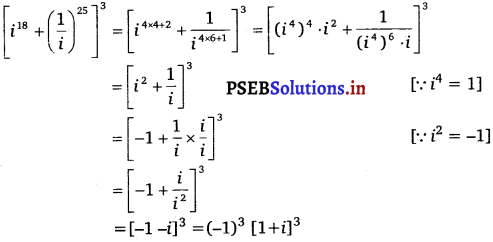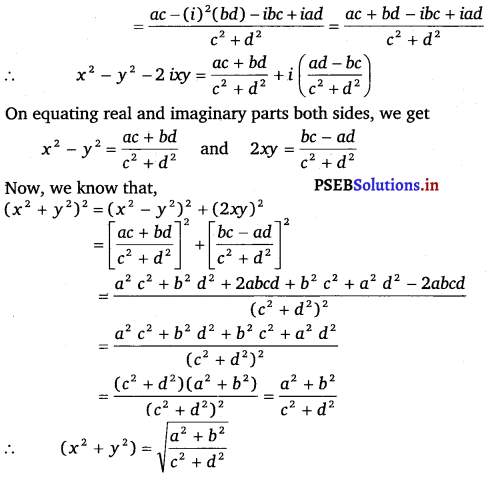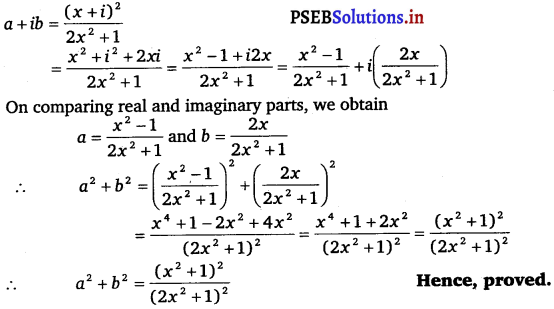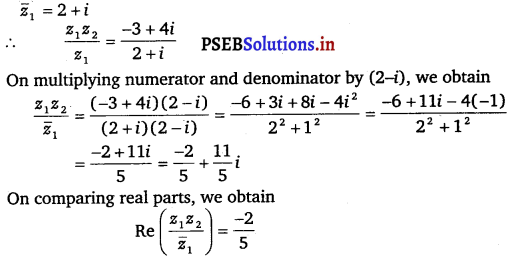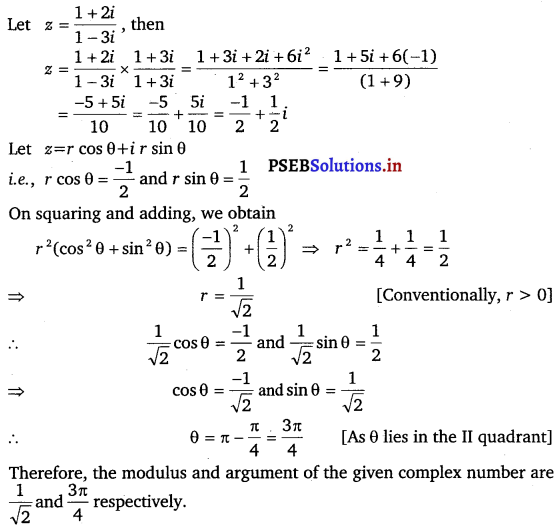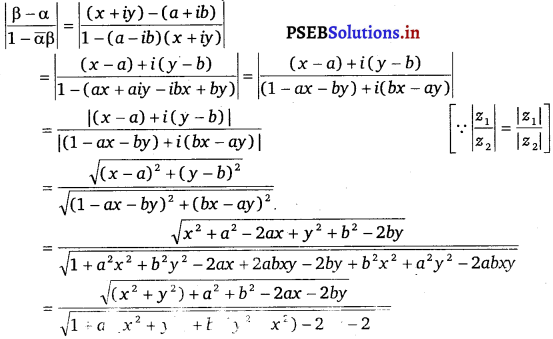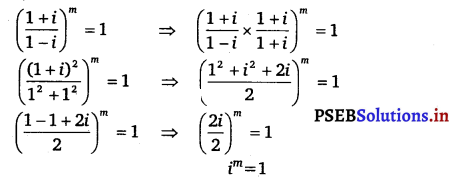Punjab State Board PSEB 11th Class Sociology Book Solutions Chapter 1 ਸਮਾਜ ਸ਼ਾਸਤਰ ਦੀ ਉਤਪਤੀ Textbook Exercise Questions and Answers.
PSEB Solutions for Class 11 Sociology Chapter 1 ਸਮਾਜ ਸ਼ਾਸਤਰ ਦੀ ਉਤਪਤੀ
Sociology Guide for Class 11 PSEB ਸਮਾਜ ਸ਼ਾਸਤਰ ਦੀ ਉਤਪਤੀ Textbook Questions and Answers
I. ਨਿਮਨਲਿਖਤ ਪ੍ਰਸ਼ਨਾਂ ਦੇ ਉੱਤਰ 1-15 ਸ਼ਬਦਾਂ ਵਿੱਚ ਦਿਓ ।
ਪ੍ਰਸ਼ਨ 1.
ਸਮਾਜ ਸ਼ਾਸਤਰ ਦਾ ਪਿਤਾਮਾ ਕਿਸ ਨੂੰ ਕਿਹਾ ਜਾਂਦਾ ਹੈ ?
ਉੱਤਰ-
ਅਗਸਤੇ ਕਾਮਤੇ ਨੂੰ ਸਮਾਜ ਸ਼ਾਸਤਰ ਦਾ ਪਿਤਾਮਾ ਮੰਨਿਆ ਜਾਂਦਾ ਹੈ ।
ਪ੍ਰਸ਼ਨ 2.
ਸਮਾਜ ਸ਼ਾਸਤਰ ਦੇ ਇੱਕ ਅਲੱਗ ਵਿਸ਼ੇ ਦੇ ਤੌਰ ‘ਤੇ ਸਥਾਪਿਤ ਹੋਣ ਦੇ ਦੋ ਮੁੱਖ ਕਾਰਨ ਦੱਸੋ ।
ਉੱਤਰ-
ਫ਼ਰਾਂਸੀਸੀ ਕ੍ਰਾਂਤੀ, ਪ੍ਰਾਕ੍ਰਿਤਕ ਵਿਗਿਆਨਾਂ ਦੇ ਵਿਕਾਸ, ਉਦਯੋਗਿਕ ਕ੍ਰਾਂਤੀ ਅਤੇ ਨਗਰੀਕਰਣ ਦੀ ਪ੍ਰਕ੍ਰਿਆ ਨੇ ਸਮਾਜ ਸ਼ਾਸਤਰ ਨੂੰ ਵੱਖਰੇ ਸਮਾਜਿਕ ਵਿਗਿਆਨ ਦੇ ਰੂਪ ਵਿੱਚ ਸਥਾਪਿਤ ਕਰਨ ਵਿੱਚ ਮੱਦਦ ਕੀਤੀ ।

ਪ੍ਰਸ਼ਨ 3.
ਸੋਸ਼ਾਲੋਜੀ ਸ਼ਬਦ ਕਿਹੜੇ ਸ਼ਬਦਾਂ ਦਾ ਸੰਗਮ ਹੈ ? ਇਹ ਵਿਸ਼ਾ ਕਦੋਂ ਹੋਂਦ ਵਿੱਚ ਆਇਆ ?
ਉੱਤਰ-
ਸਮਾਜ ਸ਼ਾਸਤਰ (Sociology) ਸ਼ਬਦ ਲਾਤੀਨੀ ਸ਼ਬਦ ‘Socios’ ਜਿਸਦਾ ਅਰਥ ਹੈ ਸਮਾਜ ਅਤੇ ਗੀਤ ਭਾਸ਼ਾ ਦੇ ਸ਼ਬਦ ‘Logos’ ਜਿਸਦਾ ਅਰਥ ਹੈ ਅਧਿਐਨ, ਦੋਵਾਂ ਤੋਂ ਮਿਲ ਕੇ ਬਣਿਆ ਹੈ ।1839 ਵਿੱਚ ਅਗਸਤੇ ਕਾਮਤੇ ਨੇ ਪਹਿਲੀ ਵਾਰੀ ਇਸ ਸ਼ਬਦ ਦਾ ਪ੍ਰਯੋਗ ਕੀਤਾ ਸੀ ।
ਪ੍ਰਸ਼ਨ 4.
ਸਮਾਜ ਸ਼ਾਸਤਰ ਦੇ ਵਿਸ਼ੇ ਖੇਤਰ ਨਾਲ ਸੰਬੰਧਿਤ ਦੋ ਸਕੂਲਾਂ ਦਾ ਵਰਣਨ ਕਰੋ ।
ਉੱਤਰ-
ਸਮਾਜ ਸ਼ਾਸਤਰ ਦੇ ਵਿਸ਼ੇ ਖੇਤਰ ਨਾਲ ਸੰਬੰਧਿਤ ਦੋ ਸਕੂਲਾਂ ਦੇ ਨਾਮ ਹਨ-ਸਰੂਪਾਤਮਕ ਸਕੂਲ (Formalistic School) ਅਤੇ ਮਿਸ਼ਰਤ ਸਕੂਲ (Synthetic School) ।
ਪ੍ਰਸ਼ਨ 5.
ਉਦਯੋਗੀਕਰਨ ਕੀ ਹੈ ?
ਉੱਤਰ-
ਉਦਯੋਗੀਕਰਨ ਦਾ ਅਰਥ ਹੈ ਸਮਾਜਿਕ ਅਤੇ ਆਰਥਿਕ ਪਰਿਵਰਤਨ ਦਾ ਉਹ ਸਮਾਂ ਜਿਸ ਨੇ ਮਨੁੱਖੀ ਸਮੂਹ ਨੂੰ ਪੇਂਡੂ ਸਮਾਜ ਤੋਂ ਉਦਯੋਗਿਕ ਸਮਾਜ ਵਿੱਚ ਬਦਲ ਦਿੱਤਾ ।
ਪ੍ਰਸ਼ਨ 6.
ਭਾਰਤ ਵਿੱਚ ਸਮਾਜ ਸ਼ਾਸਤਰ ਦੇ ਵਿਕਾਸ ਲਈ ਯਤਨਸ਼ੀਲ ਦੋ ਵਿਚਾਰਕਾਂ ਦੇ ਨਾਮ ਦੱਸੋ ।
ਉੱਤਰ-
ਜੀ. ਐੱਸ. ਯੂਰੀਏ, ਰਾਧਾ ਕਮਲ ਮੁਖਰਜੀ, ਐੱਮ. ਐੱਨ. ਨਿਵਾਸ, ਏ. ਆਰ. ਦੇਸਾਈ ਆਦਿ ।

II. ਨਿਮਨਲਿਖਤ ਪ੍ਰਸ਼ਨਾਂ ਦੇ ਉੱਤਰ 30-35 ਸ਼ਬਦਾਂ ਵਿੱਚ ਦਿਓ ।
ਪ੍ਰਸ਼ਨ 1.
ਸਮਾਜ ਸ਼ਾਸਤਰ ਦਾ ਅਰਥ ਕੀ ਹੈ ?
ਉੱਤਰ-
ਸਮਾਜ ਦੇ ਵਿਗਿਆਨ ਨੂੰ ਸਮਾਜ ਵਿਗਿਆਨ ਕਿਹਾ ਜਾਂਦਾ ਹੈ । ਸਮਾਜ ਵਿਗਿਆਨ ਵਿੱਚ ਸਮੂਹਾਂ, ਸੰਸਥਾਵਾਂ, ਸਭਾਵਾਂ, ਸੰਗਠਨ ਅਤੇ ਸਮਾਜ ਦੇ ਮੈਂਬਰਾਂ ਦੇ ਅੰਤਰ ਸੰਬੰਧਾਂ ਦਾ ਅਧਿਐਨ ਕੀਤਾ ਜਾਂਦਾ ਹੈ ਅਤੇ ਇਹ ਅਧਿਐਨ ਵਿਗਿਆਨਿਕ ਤਰੀਕੇ ਨਾਲ ਹੁੰਦਾ ਹੈ । ਸਧਾਰਨ ਸ਼ਬਦਾਂ ਵਿੱਚ ਸਮਾਜ ਵਿਗਿਆਨ ਸਮਾਜ ਦਾ ਵਿਗਿਆਨਿਕ ਅਧਿਐਨ ਹੈ ।
ਪ੍ਰਸ਼ਨ 2.
ਉਦਯੋਗਿਕ ਕ੍ਰਾਂਤੀ ਨਾਲ ਆਈਆਂ ਦੋ ਮਹੱਤਵਪੂਰਨ ਤਬਦੀਲੀਆਂ ਬਾਰੇ ਦੱਸੋ ?
ਉੱਤਰ-
- ਉਦਯੋਗਿਕ ਕ੍ਰਾਂਤੀ ਦੇ ਕਾਰਨ ਚੀਜ਼ਾਂ ਦਾ ਉਤਪਾਦਨ ਘਰਾਂ ਵਿੱਚੋਂ ਨਿਕਲ ਕੇ ਵੱਡੀਆਂ-ਵੱਡੀਆਂ ਫੈਕਟਰੀਆਂ ਵਿੱਚ ਆ ਗਿਆ ਅਤੇ ਉਤਪਾਦਨ ਵੀ ਵੱਧ ਗਿਆ ।
- ਇਸ ਨਾਲ ਨਗਰੀਕਰਨ ਵਿੱਚ ਵਾਧਾ ਹੋਇਆ ਅਤੇ ਸ਼ਹਿਰਾਂ ਵਿੱਚ ਕਈ ਪ੍ਰਕਾਰ ਦੀਆਂ ਸਮੱਸਿਆਵਾਂ ਨੇ ਜਨਮ ਲਿਆ; ਜਿਵੇਂ ਕਿ-ਵੱਧ ਜਨਸੰਖਿਆਂ, ਪ੍ਰਦੂਸ਼ਣ, ਟ੍ਰੈਫਿਕ ਆਦਿ ।
ਪ੍ਰਸ਼ਨ 3.
ਸਕਾਰਾਤਮਕਵਾਦ ਕੀ ਹੈ ?
ਉੱਤਰ-
ਸਕਾਰਾਤਮਕਵਾਦ (Positivism) ਦਾ ਸੰਕਲਪ ਅਗਸਤੇ ਕਾਮਤੇ ਨੇ ਦਿੱਤਾ ਸੀ । ਉਸ ਦੇ ਅਨੁਸਾਰ ਸਕਾਰਾਤਮਕਵਾਦ ਇੱਕ ਵਿਗਿਆਨਿਕ ਵਿਧੀ ਹੈ ਜਿਸ ਵਿੱਚ ਕਿਸੇ ਵਿਸ਼ੇ-ਵਸਤੂ ਨੂੰ ਸਮਝਣ ਅਤੇ ਪਰਿਭਾਸ਼ਿਤ ਕਰਨ ਲਈ ਕਲਪਨਾ ਜਾਂ ਅਨੁਮਾਨ ਦੀ ਕੋਈ ਥਾਂ ਨਹੀਂ ਹੁੰਦੀ । ਇਸ ਵਿੱਚ ਪ੍ਰੀਖਣ, ਤਜਰਬੇ, ਵਰਗੀਕਰਨ, ਤੁਲਨਾ ਅਤੇ ਇਤਿਹਾਸਿਕ ਵਿਧੀ ਨਾਲ ਕਿਸੇ ਵਿਸ਼ੇ ਬਾਰੇ ਸਭ ਕੁੱਝ ਸਮਝਿਆ ਜਾਂਦਾ ਹੈ ।
ਪ੍ਰਸ਼ਨ 4.
ਵਿਗਿਆਨਿਕ ਵਿਧੀ ਕੀ ਹੈ ?
ਉੱਤਰ-
ਵਿਗਿਆਨਿਕ ਵਿਧੀ (Scientific Method) ਗਿਆਨ ਪ੍ਰਾਪਤ ਕਰਨ ਦੀ ਉਹ ਵਿਧੀ ਹੈ ਜਿਸ ਦੀ ਮੱਦਦ ਨਾਲ ਵਿਗਿਆਨਿਕ ਢੰਗ ਨਾਲ ਅਧਿਐਨ ਕੀਤਾ ਜਾਂਦਾ ਹੈ । ਇਹ ਵਿਧੀ ਇੱਕ ਸਮੂਹਿਕ ਵਿਧੀ ਹੈ ਜਿਹੜੀ ਵੱਖ-ਵੱਖ ਕ੍ਰਿਆਵਾਂ ਨੂੰ ਇਕੱਠਾ ਕਰਦੀ ਹੈ ਜਿਸਦੀ ਮਦਦ ਨਾਲ ਵਿਗਿਆਨ ਦਾ ਨਿਰਮਾਣ ਹੁੰਦਾ ਹੈ ।
ਪ੍ਰਸ਼ਨ 5.
ਵਸਤੂਨਿਸ਼ਠਤਾ ਦੀ ਪਰਿਭਾਸ਼ਾ ਦਿਓ ।
ਉੱਤਰ-
ਜਦੋਂ ਕੋਈ ਸਮਾਜ ਵਿਗਿਆਨਿਕ ਆਪਣਾ ਅਧਿਐਨ ਬਿਨਾਂ ਕਿਸੇ ਪੱਖਪਾਤ ਦੇ ਕਰਦਾ ਹੈ ਤਾਂ ਉਸ ਨੂੰ ਵਸਤੁਨਿਸ਼ਠਤਾ ਕਿਹਾ ਜਾਂਦਾ ਹੈ । ਸਮਾਜ ਵਿਗਿਆਨਿਕ ਲਈ ਵਸਤੁਨਿਸ਼ਠਤਾ ਜਾਂ ਨਿਰਪੱਖਤਾ ਰੱਖਣਾ ਜ਼ਰੂਰੀ ਹੁੰਦਾ ਹੈ ਕਿਉਂਕਿ ਜੇਕਰ ਉਸਦਾ ਅਧਿਐਨ ਨਿਰਪੱਖ ਨਹੀਂ ਹੋਵੇਗਾ ਤਾਂ ਉਸਦੇ ਅਧਿਐਨ ਵਿੱਚ ਉਸਦੇ ਵਿਚਾਰਾਂ ਦਾ ਪੱਖਪਾਤ ਆ ਜਾਵੇਗਾ ਅਤੇ ਅਧਿਐਨ ਨਿਰਾਰਥਕ ਹੋ ਜਾਵੇਗਾ ।

ਪ੍ਰਸ਼ਨ 6.
ਸਮਾਜ ਸ਼ਾਸਤਰ ਦੇ ਖੇਤਰ ਅਤੇ ਵਿਸ਼ਾ-ਵਸਤੂ ਦਾ ਵਰਣਨ ਕਰੋ ।
ਉੱਤਰ-
ਸਮਾਜ ਸ਼ਾਸਤਰ ਦੇ ਖੇਤਰ ਸੰਬੰਧੀ ਦੋ ਸਕੂਲ ਪ੍ਰਚਲਿਤ ਹਨ । ਪਹਿਲਾ ਸਕੂਲ ਹੈ ਸਰੂਪਾਤਮਕ ਸਕੂਲ ਜਿਸ ਦੇ ਅਨੁਸਾਰ ਸਮਾਜ ਵਿਗਿਆਨ ਸਮਾਜਿਕ ਸੰਬੰਧਾਂ ਦੇ ਸਰੂਪ ਦਾ ਅਧਿਐਨ ਕਰਦਾ ਹੈ ਜਿਸ ਕਰਕੇ ਇਹ ਵਿਸ਼ੇਸ਼ ਵਿਗਿਆਨ ਹੈ । ਦੂਜਾ ਸਕੂਲ ਹੈ ਸੰਸ਼ਲੇਸ਼ਣਾਤਮਕ ਸਕੂਲ, ਜਿਸ ਅਨੁਸਾਰ ਸਮਾਜ ਵਿਗਿਆਨ ਬਾਕੀ ਸਾਰੇ ਸਮਾਜਿਕ ਵਿਗਿਆਨਾਂ ਦਾ ਮਿਸ਼ਰਣ ਹੈ ਅਤੇ ਇਸ ਕਰਕੇ ਇਹ ਸਾਧਾਰਨ ਵਿਗਿਆਨ ਹੈ ।
ਪ੍ਰਸ਼ਨ 7.
ਸਮਾਜ ਵਿਗਿਆਨਕ ਵਿਸ਼ਾ-ਖੇਤਰ ਦਾ ਅਧਿਐਨ ਕਰਨ ਲਈ ਕਿਹੜੀਆਂ ਵਿਧੀਆਂ ਨੂੰ ਅਪਣਾਉਂਦੇ ਹਨ ?
ਉੱਤਰ-
ਸਮਾਜ ਵਿਗਿਆਨੀ ਆਪਣੇ ਵਿਸ਼ੇ-ਖੇਤਰ ਦਾ ਅਧਿਐਨ ਕਰਨ ਲਈ ਬਹੁਤ ਸਾਰੀਆਂ ਵਿਗਿਆਨਿਕ ਵਿਧੀਆਂ ਦਾ ਪ੍ਰਯੋਗ ਕਰਦੇ ਹਨ, ਜਿਵੇਂ ਕਿ-ਸੈਂਪਲ ਵਿਧੀ, ਨਿਰੀਖਣ ਵਿਧੀ, ਇੰਟਰਵਿਊ ਵਿਧੀ, ਅਨੁਸੂਚੀ ਵਿਧੀ, ਪ੍ਰਸ਼ਨਾਵਲੀ ਵਿਧੀ, ਕੇਸ ਸਟੱਡੀ ਵਿਧੀ ਆਦਿ ।
III. ਨਿਮਨਲਿਖਤ ਪ੍ਰਸ਼ਨਾਂ ਦੇ ਉੱਤਰ 75-85 ਸ਼ਬਦਾਂ ਵਿੱਚ ਦਿਓ ।
ਪ੍ਰਸ਼ਨ 1.
ਸਰੂਪਾਤਮਕ ਸਕੂਲ ਦੀ ਵਿਚਾਰਧਾਰਾ ਮਿਸ਼ਰਤ ਸਕੂਲ ਤੋਂ ਕਿਵੇਂ ਭਿੰਨ ਹੈ ?
ਉੱਤਰ-
(i) ਸਰੂਪਾਤਮਕ ਸਕੂਲ (Formalistic School) – ਸਰੂਪਾਤਮਕ ਸੰਪ੍ਰਦਾਇ ਦੇ ਵਿਚਾਰਕਾਂ ਦੇ ਅਨੁਸਾਰ ਸਮਾਜ ਸ਼ਾਸਤਰ ਇੱਕ ਵਿਸ਼ੇਸ਼ ਵਿਗਿਆਨ ਹੈ ਜਿਸ ਵਿੱਚ ਸਮਾਜਿਕ ਸੰਬੰਧਾਂ ਦੇ ਸਰੂਪਾਂ ਦਾ ਅਧਿਐਨ ਕੀਤਾ ਜਾਂਦਾ ਹੈ । ਇਹਨਾਂ ਸਮਾਜਿਕ ਸੰਬੰਧਾਂ ਦੇ ਸਰੂਪਾਂ ਦਾ ਅਧਿਐਨ ਹੋਰ ਕੋਈ ਸਮਾਜਿਕ ਵਿਗਿਆਨ ਨਹੀਂ ਕਰਦਾ ਹੈ ਜਿਸ ਕਰਕੇ ਇਹ ਕੋਈ ਸਾਧਾਰਨ ਵਿਗਿਆਨ ਨਹੀਂ ਬਲਕਿ ਇੱਕ ਵਿਸ਼ੇਸ਼ ਵਿਗਿਆਨ ਹੈ । ਇਸ ਵਿਚਾਰਧਾਰਾ ਦੇ ਪ੍ਰਮੁੱਖ ਸਮਰਥਕ ਜਾਰਜ ਸਿਮਲ, ਮੈਕਸ ਵੈਬਰ, ਸਿੱਮਲ, ਵੀਰਕਾਂਤ, ਵਾਨ ਵੀਜ਼ੇ ਅਤੇ ਰਿਚਰਡ ਆਦਿ ਹਨ ।
(ii) ਮਿਸ਼ਰਤ ਸਕੂਲ (Synthetic School) – ਇਸ ਸੰਪ੍ਰਦਾਇ ਦੇ ਵਿਚਾਰਕਾਂ ਦੇ ਅਨੁਸਾਰ ਸਮਾਜ ਸ਼ਾਸਤਰ ਕੋਈ ਵਿਸ਼ੇਸ਼ ਵਿਗਿਆਨ ਨਹੀਂ ਬਲਕਿ ਇੱਕ ਸਾਧਾਰਨ ਵਿਗਿਆਨ ਹੈ । ਇਹ ਵੱਖ-ਵੱਖ ਸਮਾਜਿਕ ਵਿਗਿਆਨਾਂ ਤੋਂ ਸਮੱਗਰੀ ਉਧਾਰ ਲੈਂਦਾ ਹੈ ਅਤੇ ਉਹਨਾਂ ਦਾ ਅਧਿਐਨ ਕਰਦਾ ਹੈ । ਇਸ ਕਰਕੇ ਇਹ ਸਾਧਾਰਨ ਵਿਗਿਆਨ ਹੈ । ਇਸ ਵਿਚਾਰਧਾਰਾ ਦੇ ਪ੍ਰਮੁੱਖ ਸਮਰਥਕ ਇਮਾਈਲ ਦੁਰਖੀਮ, ਹਾਬਹਾਊਸ, ਸੋਰੋਕਿਨ ਆਦਿ ਹਨ ।
ਪ੍ਰਸ਼ਨ 2.
ਸਮਾਜ ਸ਼ਾਸਤਰ ਦੀ ਮਹੱਤਤਾ ਦੀ ਸੰਖੇਪ ਵਿਆਖਿਆ ਕਰੋ ।
ਉੱਤਰ-
- ਸਮਾਜ ਸ਼ਾਸਤਰ ਸਮਾਜ ਦੇ ਵਿਗਿਆਨਿਕ ਅਧਿਐਨ ਕਰਨ ਵਿੱਚ ਮੱਦਦ ਕਰਦਾ ਹੈ ।
- ਸਮਾਜ ਸ਼ਾਸਤਰ ਸਮਾਜ ਦੇ ਵਿਕਾਸ ਦੀ ਯੋਜਨਾ ਬਣਾਉਣ ਵਿੱਚ ਮੱਦਦ ਕਰਦਾ ਹੈ ਕਿਉਂਕਿ ਇਹ ਸਮਾਜ ਦਾ ਵਿਗਿਆਨਿਕ ਤਰੀਕੇ ਨਾਲ ਅਧਿਐਨ ਕਰਕੇ ਸਾਨੂੰ ਉਸ ਦੀ ਪੂਰੀ ਸੰਰਚਨਾ ਦੀ ਜਾਣਕਾਰੀ ਦਿੰਦਾ ਹੈ ।
- ਸਮਾਜ ਸ਼ਾਸਤਰ ਵੱਖ-ਵੱਖ ਸਮਾਜਿਕ ਸੰਸਥਾਵਾਂ ਦੀ ਸਾਡੇ ਜੀਵਨ ਵਿੱਚ ਮਹੱਤਤਾ ਬਾਰੇ ਦੱਸਦਾ ਹੈ ਕਿ ਇਹ ਕਿਸ ਤਰ੍ਹਾਂ ਵਿਅਕਤੀ ਦੇ ਵਿਅਕਤਿੱਤਵ ਦੇ ਵਿਕਾਸ ਵਿੱਚ ਯੋਗਦਾਨ ਦਿੰਦੇ ਹਨ ।
- ਸਮਾਜ ਸ਼ਾਸਤਰ ਵੱਖ-ਵੱਖ ਸਮੱਸਿਆਵਾਂ ਦਾ ਅਧਿਐਨ ਕਰਕੇ ਉਹਨਾਂ ਨੂੰ ਖ਼ਤਮ ਕਰਨ ਦੇ ਤਰੀਕਿਆਂ ਬਾਰੇ ਦੱਸਦਾ ਹੈ ।
- ਸਮਾਜ ਸ਼ਾਸਤਰ ਨੇ ਲੋਕਾਂ ਦੀ ਮਨੋਵਿਤੀ ਬਦਲਣ ਵਿੱਚ ਬਹੁਤ ਮੱਦਦ ਕੀਤੀ ਹੈ । ਖ਼ਾਸਕਰ ਇਸ ਨੇ ਅਪਰਾਧੀਆਂ ਨੂੰ ਸੁਧਾਰਨ ਵਿੱਚ ਮਹੱਤਵਪੂਰਨ ਭੂਮਿਕਾ ਨਿਭਾਈ ਹੈ ।
- ਸਮਾਜ ਸ਼ਾਸਤਰ ਵੱਖ-ਵੱਖ ਸੰਸਕ੍ਰਿਤੀਆਂ ਨੂੰ ਸਮਝਣ ਵਿੱਚ ਸਹਾਇਤਾ ਪ੍ਰਦਾਨ ਕਰਦਾ ਹੈ ।
ਪ੍ਰਸ਼ਨ 3.
ਫਰਾਂਸ ਦੀ ਕ੍ਰਾਂਤੀ ਨੇ ਸਮਾਜ ਤੇ ਕਿਵੇਂ ਅਸਰ ਪਾਇਆ ?
ਉੱਤਰ-
1789 ਈ: ਵਿੱਚ ਫ਼ਰਾਂਸੀਸੀ ਕ੍ਰਾਂਤੀ ਆਈ ਅਤੇ ਇਸ ਨਾਲ ਫ਼ਰਾਂਸੀਸੀ ਸਮਾਜ ਵਿੱਚ ਅਚਾਨਕ ਹੀ ਬਹੁਤ ਵੱਡਾ ਪਰਿਵਰਤਨ ਆ ਗਿਆ । ਦੇਸ਼ ਦੀ ਰਾਜਨੀਤਿਕ ਸੱਤਾ ਬਦਲ ਗਈ ਅਤੇ ਸਮਾਜਿਕ ਸੰਰਚਨਾ ਵਿੱਚ ਵੀ ਪਰਿਵਰਤਨ ਆ ਗਏ । ਤੀ ਤੋਂ ਪਹਿਲਾਂ ਬਹੁਤ ਸਾਰੇ ਵਿਚਾਰਕਾਂ ਨੇ ਪਰਿਵਰਤਨ ਦੇ ਵਿਚਾਰ ਦਿੱਤੇ । ਇਸ ਨਾਲ ਸਮਾਜ ਸ਼ਾਸਤਰ ਦੇ ਬੀਜ ਬੋ ਦਿੱਤੇ ਗਏ ਅਤੇ ਸਮਾਜ ਦੇ ਅਧਿਐਨ ਦੀ ਜ਼ਰੂਰਤ ਮਹਿਸੂਸ ਹੋਣ ਲੱਗ ਪਈ । ਵੱਖ-ਵੱਖ ਵਿਚਾਰਕਾਂ ਦੇ ਵਿਚਾਰਾਂ ਨਾਲ ਇਸ ਦਾ ਨੀਂਹ ਪੱਥਰ ਰੱਖਿਆ ਗਿਆ ਅਤੇ ਇਸ ਨੂੰ ਸਾਹਮਣੇ ਲਿਆਉਣ ਦਾ ਕੰਮ ਅਗਸਤੇ ਕਾਮਤੇ ਨੇ ਪੂਰਾ ਕੀਤਾ ਜੋ ਆਪ ਇੱਕ ਫ਼ਰਾਂਸੀਸੀ ਨਾਗਰਿਕ ਸੀ । ਇਸ ਤਰ੍ਹਾਂ ਫ਼ਰਾਂਸੀਸੀ ਕ੍ਰਾਂਤੀ ਨੇ ਸਮਾਜ ਸ਼ਾਸਤਰ ਦੀ ਉਤਪੱਤੀ ਵਿੱਚ ਬਹੁਤ ਮਹੱਤਵਪੂਰਨ ਭੂਮਿਕਾ ਨਿਭਾਈ ।

ਪ੍ਰਸ਼ਨ 4.
ਉਦਯੋਗਿਕ ਕ੍ਰਾਂਤੀ ਦਾ ਸਮਾਜ ‘ਤੇ ਕੀ ਪ੍ਰਭਾਵ ਪਿਆ ?
ਉੱਤਰ-
ਉਦਯੋਗਿਕ ਕ੍ਰਾਂਤੀ ਆਉਣ ਨਾਲ ਸਮਾਜ ਅਤੇ ਸਮਾਜਿਕ ਵਿਵਸਥਾ ਵਿੱਚ ਬਹੁਤ ਚੰਗੇ ਅਤੇ ਮਾੜੇ ਪਰਿਵਰਤਨ ਆਏ । ਸ਼ਹਿਰ, ਉਦਯੋਗ, ਸ਼ਹਿਰਾਂ ਦੀਆਂ ਸਮੱਸਿਆਵਾਂ ਆਦਿ ਵਰਗੇ ਬਹੁਤ ਸਾਰੇ ਮੁੱਦੇ ਸਾਹਮਣੇ ਆਏ ਅਤੇ ਇਹਨਾਂ ਮੁੱਦਿਆਂ ਨੇ ਹੀ ਸਮਾਜ ਸ਼ਾਸਤਰ ਦੀ ਨੀਂਹ ਰੱਖੀ । ਇਹ ਸਮਾਂ ਹੀ ਜਦੋਂ ਅਗਸਤੇ ਕਾਮ, ਇਮਾਈਲ ਦੁਰਖੀਮ, ਕਾਰਲ ਮਾਰਕਸ, ਮੈਕਸ ਵੈਬਰ ਆਦਿ ਵਰਗੇ ਸਮਾਜਸ਼ਾਸਤਰੀ ਸਾਹਮਣੇ ਆਏ ਅਤੇ ਇਹਨਾਂ ਦੇ ਸਿਧਾਂਤਾਂ ਉੱਪਰ ਹੀ ਸਮਾਜ ਸ਼ਾਸਤਰ ਟਿਕਿਆ ਹੋਇਆ ਹੈ । ਇਹਨਾਂ ਸਾਰਿਆਂ ਸਮਾਜਸ਼ਾਸਤਰੀਆਂ ਦੇ ਵਿਚਾਰਾਂ ਵਿੱਚ ਕਿਸੇ ਨਾ ਕਿਸੇ ਤਰੀਕੇ ਨਾਲ ਉਦਯੋਗਿਕ ਕ੍ਰਾਂਤੀ ਦੇ ਪ੍ਰਭਾਵ ਛੁਪੇ ਹੋਏ ਹਨ । ਇਸ ਤਰ੍ਹਾਂ ਉਦਯੋਗਿਕ ਕ੍ਰਾਂਤੀ ਦੇ ਪ੍ਰਭਾਵਾਂ ਨਾਲ ਸਮਾਜ ਵਿੱਚ ਬਹੁਤ ਸਾਰੇ ਪਰਿਵਰਤਨ ਆਏ ਅਤੇ ਇਸ ਕਾਰਨ ਸਮਾਜ ਸ਼ਾਸਤਰ ਦੇ ਜਨਮ ਵਿੱਚ ਉਦਯੋਗਿਕ ਕ੍ਰਾਂਤੀ ਨੇ ਮਹੱਤਵਪੂਰਨ ਭੂਮਿਕਾ ਨਿਭਾਈ ।
ਪ੍ਰਸ਼ਨ 5.
ਸਮਾਜ ਸ਼ਾਸਤਰ ਆਪਣੇ ਵਿਸ਼ੇ-ਖੇਤਰ ਵਿੱਚ ਵਿਗਿਆਨਿਕ ਵਿਧੀ ਦਾ ਪ੍ਰਯੋਗ ਕਰਦਾ ਹੈ । ਵਿਆਖਿਆ ਕਰੋ ।
ਉੱਤਰ-
ਸਮਾਜ ਸ਼ਾਸਤਰ ਸਮਾਜਿਕ ਤੱਥਾਂ ਦੇ ਅਧਿਐਨ ਦੇ ਲਈ ਕਈ ਵਿਗਿਆਨਿਕ ਵਿਧੀਆਂ ਦਾ ਪ੍ਰਯੋਗ ਕਰਦਾ ਹੈ । ਤੁਲਨਾਤਮਕ ਵਿਧੀ, ਇਤਿਹਾਸਿਕ ਵਿਧੀ ਆਦਿ ਕਈ ਤਰ੍ਹਾਂ ਦੀਆਂ ਵਿਧੀਆਂ ਦਾ ਪ੍ਰਯੋਗ ਕਰਕੇ ਸਮਾਜਿਕ ਸਮੱਸਿਆਵਾਂ ਸੁਲਝਾਉਂਦਾ ਹੈ । ਇਹ ਸਭ ਵਿਧੀਆਂ ਵਿਗਿਆਨਿਕ ਹਨ । ਸਮਾਜ ਵਿਗਿਆਨ ਦਾ ਗਿਆਨ ਵਿਵਸਥਿਤ ਹੈ । ਇਹ ਵਿਗਿਆਵਿਕ ਵਿਧੀ ਦੀ ਵਰਤੋਂ ਕਰਕੇ ਹੀ ਗਿਆਨ ਪ੍ਰਾਪਤ ਕਰਦਾ ਹੈ । ਇਸ ਵਿੱਚ ਹੋਰ ਵੀ ਵਿਗਿਆਨਿਕ ਵਿਧੀਆਂ ਦਾ ਪ੍ਰਯੋਗ ਕੀਤਾ ਜਾਂਦਾ ਹੈ; ਜਿਵੇਂ ਕਿ ਸੈਂਪਲ ਵਿਧੀ, ਨਿਰੀਖਣ ਵਿਧੀ, ਅਨੁਸੂਚੀ ਵਿਧੀ, ਇੰਟਰਵਿਉ ਵਿਧੀ, ਪ੍ਰਸ਼ਨਾਵਲੀ ਵਿਧੀ, ਕੇਸ ਸਟੱਡੀ ਵਿਧੀ ਆਦਿ । ਇਹਨਾਂ ਵਿਧੀਆਂ ਦੀ ਮੱਦਦ ਨਾਲ ਅੰਕੜਿਆਂ ਨੂੰ ਵਿਵਸਥਿਤ ਤਰੀਕੇ ਨਾਲ ਇਕੱਠਾ ਕੀਤਾ ਜਾਂਦਾ ਹੈ, ਜਿਸ ਨਾਲ ਸਮਾਜ ਸ਼ਾਸਤਰ ਇੱਕ ਵਿਗਿਆਨ ਬਣ ਜਾਂਦਾ ਹੈ ।
IV. ਨਿਮਨਲਿਖਤ ਪ੍ਰਸ਼ਨਾਂ ਦੇ ਉੱਤਰ 250-300 ਸ਼ਬਦਾਂ ਵਿੱਚ ਦਿਓ ।
ਪ੍ਰਸ਼ਨ 1.
ਸਮਾਜ ਸ਼ਾਸਤਰ ਤੋਂ ਕੀ ਭਾਵ ਹੈ ? ਇਸ ਦੇ ਵਿਸ਼ਾ ਖੇਤਰ ਦਾ ਵਰਣਨ ਕਰੋ ।
ਉੱਤਰ-
ਜੇਕਰ ਅਸੀਂ ਆਮ ਸ਼ਬਦਾਂ ਵਿਚ ਸਮਾਜ ਸ਼ਾਸਤਰ ਦਾ ਅਰਥ ਦੇਖੀਏ ਤਾਂ ਸਾਨੂੰ ਪਤਾ ਚੱਲੇਗਾ ਕਿ ਸਮਾਜ ਸ਼ਾਸਤਰ ਸਮਾਜ ਦਾ ਵਿਗਿਆਨਿਕ ਤੌਰ ਉੱਤੇ ਅਧਿਐਨ ਹੈ । ਇਸ ਵਿਚ ਮਨੁੱਖਾਂ ਦੇ ਆਪਸੀ ਸੰਬੰਧਾਂ ਦਾ ਅਧਿਐਨ ਕੀਤਾ ਜਾਂਦਾ ਹੈ । ਸਮਾਜ ਸ਼ਾਸਤਰ ਮਨੁੱਖਾਂ ਦੇ ਵਿਵਹਾਰ ਦੀਆਂ ਆਪਸੀ ਕ੍ਰਿਆਵਾਂ ਦਾ ਅਧਿਐਨ ਕਰਦਾ ਹੈ । ਇਹ ਇਸ ਗੱਲ ਬਾਰੇ ਪਤਾ ਕਰਨ ਦੀ ਕੋਸ਼ਿਸ਼ ਕਰਦਾ ਹੈ ਕਿ ਵੱਖ-ਵੱਖ ਸਮੂਹ ਕਿਸ ਤਰ੍ਹਾਂ ਹੋਂਦ ਵਿਚ ਆਏ, ਕਿਸ ਤਰ੍ਹਾਂ ਵਿਕਸਿਤ ਹੋਏ, ਕਿਵੇਂ ਖ਼ਤਮ ਹੋਏ ਅਤੇ ਕਿਸ ਤਰ੍ਹਾਂ ਉਹਨਾਂ ਦੀ ਥਾਂ ਉੱਤੇ ਹੋਰ ਸਮੂਹ ਅੱਗੇ ਆ ਗਏ । ਸਮਾਜ ਸ਼ਾਸਤਰ ਸਮੂਹਾਂ ਦੀਆਂ ਕਾਰਜ ਵਿਧੀਆਂ, ਰਿਵਾਜਾਂ, ਪਰੰਪਰਾਵਾਂ, ਸਮੂਹਾਂ ਅਤੇ ਸੰਸਥਾਵਾਂ ਦਾ ਅਧਿਐਨ ਕਰਦਾ ਹੈ ।
ਸਮਾਜ ਸ਼ਾਸਤਰ ਦਾ ਜਨਮਦਾਤਾ ਅਗਸਤੇ ਕਾਮਤੇ ਨੂੰ ਮੰਨਿਆ ਜਾਂਦਾ ਹੈ ਜੋ ਕਿ ਫ਼ਰਾਂਸ ਦਾ ਇਕ ਸਮਾਜਿਕ ਦਾਰਸ਼ਨਿਕ ਸੀ । ਉਸਨੇ 1830 ਤੋਂ 1842 ਦੇ ਵਿਚਕਾਰ ਇਕ ਕਿਤਾਬ Positive Philosophy ਲਿਖੀ ਜੋ ਕਿ 6 ਹਿੱਸਿਆਂ ਵਿਚ ਛਪੀ । ਉਸਨੇ ਇਸ ਕਿਤਾਬ ਵਿਚ ਸਮਾਜਿਕ ਸੰਬੰਧਾਂ ਦਾ ਅਧਿਐਨ ਕਰਨ ਵਾਲੇ ਵਿਗਿਆਨ ਦੀ ਗੱਲ ਦੱਸੀ ਜਿਸ ਦਾ ਨਾਮ ਉਨ੍ਹਾਂ ਨੇ ‘ਸਮਾਜ ਸ਼ਾਸਤਰ’ ਰੱਖਿਆ । ਇਸ ਸ਼ਬਦ ਦਾ ਪ੍ਰਯੋਗ ਸਭ ਤੋਂ ਪਹਿਲਾਂ 1839 ਈ: ਵਿਚ ਕੀਤਾ ਗਿਆ ਸੀ ।
ਸਮਾਜ ਸ਼ਾਸਤਰ ਨੂੰ ਸਮਝਣ ਲਈ ਇਹ ਜ਼ਰੂਰੀ ਹੈ ਕਿ ਅਸੀਂ ਇਸ ਦੇ ਸ਼ਾਬਦਿਕ ਅਰਥ ਨੂੰ ਦੇਖ ਲਈਏ । ਜੇਕਰ ਸਮਾਜ ਵਿਗਿਆਨ ਦੇ ਸ਼ਾਬਦਿਕ ਅਰਥਾਂ ਨੂੰ ਦੇਖਿਆ ਜਾਵੇ ਤਾਂ ਸਾਨੂੰ ਪਤਾ ਚੱਲੇਗਾ ਕਿ ਇਹ ਦੋ ਸ਼ਬਦਾਂ Socio ਅਤੇ Logos ਤੋਂ ਮਿਲ ਕੇ ਬਣਿਆ ਹੈ । Socio ਲਾਤੀਨੀ ਭਾਸ਼ਾ ਦਾ ਸ਼ਬਦ ਹੈ ਜਿਸ ਦਾ ਅਰਥ ਹੈ ਸਮਾਜ ਅਤੇ ਸ਼ਬਦ Logos ਯੂਨਾਨੀ ਭਾਸ਼ਾ (ਸ੍ਰੀਕ ਭਾਸ਼ਾ ਦਾ ਸ਼ਬਦ ਹੈ ਜਿਸ ਦਾ ਅਰਥ ਹੈ ਵਿਗਿਆਨ । ਇਸ ਤਰ੍ਹਾਂ ਸਮਾਜ ਸ਼ਾਸਤਰ ਦਾ ਸ਼ਾਬਦਿਕ ਅਰਥ ਹੈ ਸਮਾਜ ਦਾ ਵਿਗਿਆਨ । ਸਮਾਜਿਕ ਸੰਬੰਧਾਂ ਦਾ ਅਧਿਐਨ ਕਰਨ ਵਾਲੇ ਵਿਗਿਆਨ ਨੂੰ ਸਮਾਜ ਸ਼ਾਸਤਰ ਕਿਹਾ ਜਾਂਦਾ ਹੈ ।
ਪਰਿਭਾਸ਼ਾਵਾਂ (Definitions)
- ਮੈਕਾਈਵਰ ਤੇ ਪੇਜ (MacIver and Page) ਦੇ ਅਨੁਸਾਰ, “ਸਮਾਜ ਵਿਗਿਆਨ ਸਮਾਜਿਕ ਸੰਬੰਧਾਂ ਬਾਰੇ ਹੈ, ਸੰਬੰਧਾਂ ਦੇ ਜਾਲ ਨੂੰ ਅਸੀਂ ਸਮਾਜ ਕਹਿੰਦੇ ਹਾਂ ।”
- ਗਿਡਿੰਗਜ਼ (Giddings) ਦੇ ਅਨੁਸਾਰ, “ਸਮਾਜ ਵਿਗਿਆਨ ਪੂਰਨ ਰੂਪ ਨਾਲ ਸਮਾਜ ਦਾ ਕੁਮਬੱਧ ਵਰਣਨ ਤੇ ਵਿਆਖਿਆ ਹੈ।”
- ਜਿਨਸਬਰਗ (Ginsberg) ਦੇ ਅਨੁਸਾਰ, “ਸਮਾਜ ਵਿਗਿਆਨ ਮਨੁੱਖਾਂ ਦੀਆਂ ਅੰਤਰ-ਕ੍ਰਿਆਵਾਂ ਤੇ ਅੰਤਰ ਸੰਬੰਧਾਂ, ਉਹਨਾਂ ਦੇ ਕਾਰਨਾਂ ਤੇ ਪਰਿਣਾਮਾਂ ਦਾ ਅਧਿਐਨ ਹੈ ।”
- ਦੁਰਖੀਮ (Durkheim) ਦੇ ਅਨੁਸਾਰ, “ਸਮਾਜ ਵਿਗਿਆਨ ਸਮਾਜਿਕ ਸੰਸਥਾਵਾਂ, ਉਹਨਾਂ ਦੀ ਉੱਤਪਤੀ ਤੇ ਵਿਕਾਸ ਦਾ ਅਧਿਐਨ ਹੈ ।
- ਮੈਕਸ ਵੈਬਰ (Max Weber) ਦੇ ਅਨੁਸਾਰ, “ਸਮਾਜ ਵਿਗਿਆਨ ਉਹ ਵਿਗਿਆਨ ਹੈ ਜੋ ਸਮਾਜਿਕ ਕ੍ਰਿਆਵਾਂ ਦਾ ਵਿਆਖਿਆਤਮਕ ਬੋਧ ਕਰਵਾਉਣ ਦਾ ਯਤਨ ਕਰਦਾ ਹੈ ।”
ਇਸ ਤਰ੍ਹਾਂ ਇਹਨਾਂ ਪਰਿਭਾਸ਼ਾਵਾਂ ਦੇ ਆਧਾਰ ਉੱਤੇ ਅਸੀਂ ਕਹਿ ਸਕਦੇ ਹਾਂ ਕਿ ਸਮਾਜ ਵਿਗਿਆਨ ਸਮਾਜ ਦਾ ਵਿਗਿਆਨਿਕ ਰੂਪ ਨਾਲ ਅਧਿਐਨ ਕਰਦਾ ਹੈ । ਇਹ ਵਿਅਕਤੀਆਂ ਅਤੇ ਸਮੂਹਾਂ ਵਿਚ ਪਾਏ ਗਏ ਵਿਵਹਾਰਾਂ, ਆਪਸੀ ਸੰਬੰਧਾਂ ਅਤੇ ਕੰਮਾਂ ਦਾ ਵੀ ਅਧਿਐਨ ਕਰਦਾ ਹੈ । ਮਨੁੱਖਾਂ ਦੇ ਸਾਰੇ ਰੀਤੀ ਰਿਵਾਜਾਂ, ਮਨੁੱਖੀ ਸੰਸਥਾਵਾਂ ਦੇ ਉਦੇਸ਼ਾਂ, ਉਹਨਾਂ ਦੇ ਸਰੂਪਾਂ ਆਦਿ ਨੂੰ ਸਮਝਣ ਦੀ ਕੋਸ਼ਿਸ਼ ਵੀ ਸਮਾਜ ਵਿਗਿਆਨ ਦੁਆਰਾ ਕੀਤੀ ਜਾਂਦੀ ਹੈ ।
ਸਮਾਜ ਵਿਗਿਆਨ ਦਾ ਵਿਸ਼ਾ-ਖੇਤਰ (Scope of Sociology)
ਸਮਾਜ ਵਿਗਿਆਨ ਦੇ ਵਿਸ਼ੇ-ਖੇਤਰ ਨੂੰ ਦੱਸਣ ਲਈ ਦੋ ਵੱਖ-ਵੱਖ ਵਿਚਾਰਧਾਰਾਵਾਂ ਹਨ । ਇਕ ਵਿਚਾਰਧਾਰਾ ਦੇ ਅਨੁਸਾਰ ਸਮਾਜ ਵਿਗਿਆਨ ਇਕ ਵਿਸ਼ੇਸ਼ ਵਿਗਿਆਨ ਹੈ ਅਤੇ ਦੂਜੀ ਵਿਚਾਰਧਾਰਾ ਦੇ ਅਨੁਸਾਰ ਸਮਾਜ ਵਿਗਿਆਨ ਇਕ ਸਾਧਾਰਨ ਵਿਗਿਆਨ ਹੈ । ਇਨ੍ਹਾਂ ਦੋਹਾਂ ਵਿਚਾਰਧਾਰਾਵਾਂ ਦਾ ਵਰਣਨ ਇਸ ਤਰ੍ਹਾਂ ਦਿੱਤਾ ਗਿਆ ਹੈ । ਇਹ ਦੋ ਵਿਚਾਰਧਾਰਾਵਾਂ ਹਨ-
(I) ਸਰੂਪਾਤਮਕ ਵਿਚਾਰਧਾਰਾ (Formalistic School) – ਵਿਸ਼ੇਸ਼ ਵਿਗਿਆਨ
(II) ਮਿਸ਼ਰਿਤ ਵਿਚਾਰਧਾਰਾ (Synthetic School) – ਸਾਧਾਰਨ ਵਿਗਿਆਨ ।
(I) ਸਰੂਪਾਤਮਕ ਵਿਚਾਰਧਾਰਾ (Formalistic School) – ਇਸ ਵਿਚਾਰਧਾਰਾ ਦੇ ਸਮਰਥਕ-ਜਾਰਜ ਸਿੱਮਲ (George Simmel), ਰਿਚਰਡ (Richard), ਟੋਨੀਜ਼ (Tonnies), ਵਾਨ ਵੀਜ਼ੇ (Van wiese), ਵੀਹਕਾਂਤ (Vier kandt), ਮੈਕਸ ਵੈਬਰ (Max Weber) ਆਦਿ ਹਨ ।
ਇਹਨਾਂ ਸਮਾਜਸ਼ਾਸਤਰੀਆਂ ਅਨੁਸਾਰ ਸਮਾਜ ਸ਼ਾਸਤਰ ਹੋਰ ਸਮਾਜਿਕ ਵਿਗਿਆਨਾਂ ਦੀ ਤਰ੍ਹਾਂ ਇਕ ਵਿਸ਼ੇਸ਼ ਵਿਗਿਆਨ ਹੈ । ਇਨ੍ਹਾਂ ਅਨੁਸਾਰ ਸਮਾਜ ਵਿਗਿਆਨ ਸਿਰਫ਼ ਸਮਾਜਿਕ ਸੰਬੰਧਾਂ ਦੇ ਸਰੂਪਾਂ ਦਾ ਅਧਿਐਨ ਕਰਦਾ ਹੈ ਜਿਸ ਕਰਕੇ ਇਹ ਵਿਸ਼ੇਸ਼ ਵਿਗਿਆਨ ਹੈ । ਕੋਈ ਹੋਰ ਸਮਾਜਿਕ ਵਿਗਿਆਨ ਸਮਾਜਿਕ ਸੰਬੰਧਾਂ ਦੇ ਸਰੂਪਾਂ ਦਾ ਅਧਿਐਨ ਨਹੀਂ ਕਰਦਾ ਸਿਰਫ਼ ਸਮਾਜ ਸ਼ਾਸਤਰ ਹੀ ਸਮਾਜਿਕ ਸੰਬੰਧਾਂ ਦੇ ਸਰੂਪਾਂ ਦਾ ਅਧਿਐਨ ਕਰਦਾ ਹੈ । ਇਸ ਕਰਕੇ ਇਹ ਵਿਸ਼ੇਸ਼ ਵਿਗਿਆਨ ਹੈ । ਇਸ ਵਿਚਾਰਧਾਰਾ ਦੇ ਸਮਰਥਕਾਂ ਅਨੁਸਾਰ ਕਿਉਂਕਿ ਸਮਾਜ ਵਿਗਿਆਨ ਸਮਾਜਿਕ ਸੰਬੰਧਾਂ ਦੇ ਸਰੂਪਾਂ ਦਾ ਅਧਿਐਨ ਕਰਦਾ ਹੈ । ਇਸ ਕਰਕੇ ਇਹ ਇਕ ਵਿਸ਼ੇਸ਼ ਵਿਗਿਆਨ ਹੈ ਅਤੇ ਸਰੂਪ ਅਤੇ ਅੰਤਰ ਵਸਤੂ ਅੱਡ-ਅੱਡ ਚੀਜ਼ਾਂ ਹਨ । ਸਮਾਜ ਵਿਗਿਆਨ ਆਪਣੀ ਵਿਸ਼ੇਸ਼ ਹੋਂਦ ਬਣਾਏ ਰੱਖਣ ਲਈ ਸਮਾਜਿਕ ਸੰਬੰਧਾਂ ਦੇ ਸਰੂਪਾਂ ਦਾ ਅਧਿਐਨ ਕਰਦਾ ਹੈ ਅੰਤਰ-ਵਸਤੂ ਦਾ ਨਹੀਂ । ਇਸੇ ਕਰਕੇ ਇਸ ਵਿਚਾਰਧਾਰਾ ਨੂੰ ਸਰੂਪਾਤਮਕ ਸੰਪ੍ਰਦਾਇ ਜਾਂ ਵਿਚਾਰਧਾਰਾ ਕਿਹਾ ਜਾਂਦਾ ਹੈ । ਇਸ ਵਿਚਾਰਧਾਰਾ ਦੇ ਸਮਰਥਕਾਂ ਦੇ ਵੱਖ-ਵੱਖ ਵਿਚਾਰ ਇਸ ਪ੍ਰਕਾਰ ਹਨ-
1. ਸਿੱਮਲ ਦੇ ਵਿਚਾਰ (Views of Simmel) – ਸਿੱਪਲ ਦੇ ਅਨੁਸਾਰ ਸਮਾਜ ਵਿਗਿਆਨ ਇਕ ਵਿਸ਼ੇਸ਼ ਵਿਗਿਆਨ ਹੈ। ਕਿਉਂਕਿ ਸਮਾਜ ਵਿਗਿਆਨ ਸਮਾਜਿਕ ਸੰਬੰਧਾਂ ਦੇ ਸਰੂਪਾਂ ਦਾ ਅਧਿਐਨ ਕਰਦਾ ਹੈ ਜਦਕਿ ਹੋਰ ਸਮਾਜਿਕ ਵਿਗਿਆਨ ਇਨ੍ਹਾਂ ਹੀ ਸੰਬੰਧਾਂ ਦੇ ਅੰਤਰ-ਵਸਤੁ ਦਾ ਅਧਿਐਨ ਕਰਦੇ ਹਨ । ਸਿੱਮਲ ਅਨੁਸਾਰ ਸਮਾਜ ਸ਼ਾਸਤਰ ਹੋਰ ਸਮਾਜਿਕ ਵਿਗਿਆਨਾਂ ਤੋਂ ਅੱਡ ਦ੍ਰਿਸ਼ਟੀਕੋਣ ਕਰਕੇ ਅਲੱਗ ਹੈ । ਕਿਸੇ ਵੀ ਸਮੂਹਿਕ ਸਮਾਜਿਕ ਘਟਨਾ ਦਾ ਅਧਿਐਨ ਕਿਸੇ ਵੀ ਸਮਾਜਿਕ ਵਿਗਿਆਨ ਦੁਆਰਾ ਕੀਤਾ ਜਾਂਦਾ ਹੈ । ਸਮਾਜ ਸ਼ਾਸਤਰ ਇਸ ਕਰਕੇ ਵਿਸ਼ੇਸ਼ ਵਿਗਿਆਨ ਹੈ ਕਿਉਂਕਿ ਇਹ ਸਮਾਜ ਦੇ ਉਨ੍ਹਾਂ ਹਿੱਸਿਆਂ ਦਾ ਅਧਿਐਨ ਕਰਦਾ ਹੈ ਜਿਨ੍ਹਾਂ ਦਾ ਅਧਿਐਨ ਹੋਰ ਸਮਾਜਿਕ ਵਿਗਿਆਨ ਨਹੀਂ ਕਰਦੇ । ਸਿੰਮਲ ਦਾ ਕਹਿਣਾ ਹੈ ਕਿ ਅੰਤਰਕ੍ਰਿਆਵਾਂ ਦੇ ਦੋ ਰੂਪ ਹੁੰਦੇ ਹਨ
- ਸੂਖ਼ਮ ਰੂਪ (Abstract form),
- ਸਬੂਲ ਰੂਪ (Concrete form) ।
ਸਮਾਜਿਕ ਸੰਬੰਧ, ਜਿਵੇਂ, ਪ੍ਰਤਿਯੋਗਿਤਾ, ਸੰਘਰਸ਼, ਕਿਰਤ ਵੰਡ, ਅਧੀਨਗੀ, ਪ੍ਰਭੂਤਵ ਆਦਿ ਅੰਤਰ-ਕ੍ਰਿਆਵਾਂ ਦੇ ਸੂਖ਼ਮ ਰੁਪ ਹੁੰਦੇ ਹਨ ਅਤੇ ਸਮਾਜ ਸ਼ਾਸਤਰ ਇਨ੍ਹਾਂ ਸੂਖ਼ਮ ਰੁਪਾਂ ਦਾ ਅਧਿਐਨ ਕਰਦਾ ਹੈ । ਸਮਾਜ ਸ਼ਾਸਤਰ ਤੋਂ ਇਲਾਵਾ ਹੋਰ ਕੋਈ ਵਿਗਿਆਨ ਇਨ੍ਹਾਂ ਦਾ ਅਧਿਐਨ ਨਹੀਂ ਕਰਦਾ ਹੈ । ਇਸ ਦੇ ਨਾਲ ਹੀ ਸਮਾਜ ਸ਼ਾਸਤਰ ਦਾ ਹੋਰ ਸਮਾਜਿਕ ਵਿਗਿਆਨਾਂ ਨਾਲ ਉਹੀ ਸੰਬੰਧ ਹੈ ਜੋ ਰੇਖਾ ਗਣਿਤ (Geometry) ਦਾ ਹੋਰ ਪ੍ਰਾਕ੍ਰਿਤਕ ਵਿਗਿਆਨਾਂ ਨਾਲ ਹੈ । ਇਸ ਦਾ ਅਰਥ ਹੈ ਕਿ ਰੇਖਾ ਗਣਿਤ ਭੌਤਿਕ ਚੀਜ਼ਾਂ ਦੇ ਸਰੂਪਾਂ ਦਾ ਅਧਿਐਨ ਕਰਦਾ ਹੈ ਅਤੇ ਪਾਕ੍ਰਿਤਕ ਵਿਗਿਆਨ ਉਨ੍ਹਾਂ ਚੀਜ਼ਾਂ ਦੇ ਅੰਤਰ-ਵਸਤੁ ਦਾ ਅਧਿਐਨ ਕਰਦੇ ਹਨ । ਇਸੇ ਤਰੀਕੇ ਨਾਲ ਸਮਾਜਿਕ ਸੰਬੰਧਾਂ ਦੇ ਸਰੂਪਾਂ ਦਾ ਅਧਿਐਨ ਸਮਾਜ ਵਿਗਿਆਨ ਕਰਦਾ ਹੈ ਅਤੇ ਹੋਰ ਸਮਾਜਿਕ ਵਿਗਿਆਨ, ਸਮਾਜਿਕ ਸੰਬੰਧਾਂ ਦੇ ਅੰਤਰ ਵਸਤੂ ਦਾ ਅਧਿਐਨ ਕਰਦੇ ਹਨ । ਇਸ ਤਰ੍ਹਾਂ ਸਿੱਪਲ ਦੇ ਅਨੁਸਾਰ ਮਨੁੱਖਾਂ ਦੇ ਵਿਵਹਾਰ ਦੇ ਸੂਖਮ ਰੂਪਾਂ ਦਾ ਅਧਿਐਨ ਸਿਰਫ਼ ਸਮਾਜ ਸ਼ਾਸਤਰ ਕਰਦਾ ਹੈ ਜਿਸ ਕਰਕੇ ਇਹ ਇਕ ਵਿਸ਼ੇਸ਼ ਵਿਗਿਆਨ ਹੈ ।
2. ਵੀਕਾਂਤ ਦੇ ਵਿਚਾਰ (views of Vierkandt) – ਵੀਕਾਂਤ ਵੀ ਇਕ ਮਹੱਤਵਪੂਰਨ ਸਮਾਜ ਵਿਗਿਆਨੀ ਹੈ ਜਿਸ ਦੇ ਅਨੁਸਾਰ ਸਮਾਜ ਸ਼ਾਸਤਰ ਗਿਆਨ ਦੀ ਉਸ ਵਿਸ਼ੇਸ਼ ਸ਼ਾਖਾਂ ਨਾਲ ਸੰਬੰਧਿਤ ਹੈ ਜਿਸ ਵਿਚ ਮਾਨਸਿਕ ਸੰਬੰਧਾਂ ਦੀਆਂ ਕਿਸਮਾਂ ਹੁੰਦੀਆਂ ਹਨ ਅਤੇ ਜਿਹੜੀਆਂ ਵਿਅਕਤੀਆਂ ਨੂੰ ਇਕ-ਦੂਜੇ ਨਾਲ ਜੋੜਦੀਆਂ ਹਨ । ਮਨੁੱਖ ਆਪਣੀਆਂ ਇੱਛਾਵਾਂ, ਕਲਪਨਾਵਾਂ, ਸੁਪਨਿਆਂ ਤੋਂ ਬਿਨਾਂ ਹੋਰ ਵਿਅਕਤੀਆਂ ਨਾਲ ਸੰਬੰਧ ਸਥਾਪਿਤ ਨਹੀਂ ਕਰ ਸਕਦਾ । ਇਸ ਤਰ੍ਹਾਂ ਵੀਰਕਾਂਤ ਦੇ ਅਨੁਸਾਰ ਸਮਾਜ ਸ਼ਾਸਤਰ ਸਮਾਜਿਕ ਸੰਬੰਧਾਂ ਤੋਂ ਮਾਨਸਿਕ ਸਰੂਪਾਂ ਨੂੰ ਅਲੱਗ ਕਰਕੇ ਹੀ ਅਧਿਐਨ ਕਰਦਾ ਹੈ । ਉਦਾਹਰਨ ਦੇ ਤੌਰ ਉੱਤੇ ਸਮਾਜ ਸ਼ਾਸਤਰ ਕਿਸੇ ਵੀ ਸਮਾਜ ਦੀ ਉੱਤਪਤੀ, ਵਿਕਾਸ, ਪ੍ਰਗਤੀ, ਵਿਸ਼ੇਸ਼ਤਾਵਾਂ ਆਦਿ ਦਾ ਅਧਿਐਨ ਨਹੀਂ ਕਰਦਾ ਬਲਕਿ ਉਸ ਸਮਾਜ ਦੇ ਮਾਨਸਿਕ ਸਰੂਪਾਂ ਦਾ ਅਧਿਐਨ ਕਰਦਾ ਹੈ | ਸਮਾਜ ਸ਼ਾਸਤਰ, ਵਿਗਿਆਨ ਦੇ ਮੂਲ ਤੱਤਾਂ ਜਿਵੇਂ ਪਿਆਰ, ਨਫ਼ਰਤ, ਪ੍ਰਤਿਯੋਗਿਤਾ, ਲਾਲਚ, ਸਹਿਯੋਗ ਆਦਿ ਦਾ ਅਧਿਐਨ ਕਰਦਾ ਹੈ । ਵੀਕਾਂਤ ਨੇ ਸਮਾਜ ਸ਼ਾਸਤਰ ਵਿਚ ਸਮਾਜਿਕ ਅਤੇ ਮਾਨਸਿਕ ਸਰੂਪਾਂ ਨੂੰ ਵੱਖ-ਵੱਖ ਕੀਤਾ ਹੈ । ਇਸ ਆਧਾਰ ਉੱਤੇ ਵੀਕਾਂਤ ਦੇ ਅਨੁਸਾਰ ਸਮਾਜ ਸ਼ਾਸਤਰ ਇਕ ਵਿਸ਼ੇਸ਼ ਵਿਗਿਆਨ ਹੈ ।
3. ਵਾਨ ਵੀਜ਼ੇ ਦੇ ਵਿਚਾਰ (Views of Van Weise) – ਵਾਨ ਵੀਜ਼ੇ ਵੀ ਅਜਿਹਾ ਸਮਾਜ ਵਿਗਿਆਨੀ ਹੋਇਆ ਹੈ ਜਿਸ ਦੇ ਅਨੁਸਾਰ ਸਮਾਜ ਸ਼ਾਸਤਰ ਇਕ ਵਿਸ਼ੇਸ਼ ਵਿਗਿਆਨ ਹੈ । ਉਸ ਦੇ ਅਨੁਸਾਰ ਸਮਾਜਿਕ ਸੰਬੰਧਾਂ ਦੇ ਸਰੂਪਾਂ ਤੇ ਅੰਤਰ ਵਸਤੁ ਨੂੰ ਵੱਖ-ਵੱਖ ਕਰਕੇ ਉਨ੍ਹਾਂ ਦਾ ਅਧਿਐਨ ਕੀਤਾ ਜਾ ਸਕਦਾ ਹੈ । ਵਾਨ ਵੀਜ਼ੇ ਦਾ ਕਹਿਣਾ ਸੀ ਕਿ ਸਮਾਜ ਸ਼ਾਸਤਰ ਸਮਾਜਿਕ ਜਾਂ ਅੰਤਰ ਮਨੁੱਖੀ ਕ੍ਰਿਆਵਾਂ ਦਾ ਅਧਿਐਨ ਹੈ । ਇਸ ਦ੍ਰਿਸ਼ਟੀਕੋਣ ਤੋਂ ਸਮਾਜ ਸ਼ਾਸਤਰ ਦਾ ਅਧਿਐਨ ਖੇਤਰ ਸੀਮਿਤ ਹੈ ਜਿਸ ਕਰਕੇ ਅਸੀਂ ਇਸ ਨੂੰ ਹੋਰ ਸਮਾਜ ਵਿਗਿਆਨਾਂ ਤੋਂ ਵੱਖ ਕਰ ਸਕਦੇ ਹਾਂ । ਵਾਨ ਵੀਜ਼ੇ ਦਾ ਕਹਿਣਾ ਸੀ ਕਿ ਸਮਾਜ ਸ਼ਾਸਤਰ ਹੋਰ ਸਮਾਜਿਕ ਵਿਗਿਆਨਾਂ ਦੁਆਰਾ ਕੱਢੇ ਨਤੀਜਿਆਂ ਨੂੰ ਇਸੇ ਤਰ੍ਹਾਂ ਹੀ ਇਕੱਠਾ ਨਹੀਂ ਕਰਦਾ ਬਲਕਿ ਸਮਾਜਿਕ ਜੀਵਨ ਬਾਰੇ ਸਹੀ ਜਾਣਕਾਰੀ ਪ੍ਰਾਪਤ ਕਰਦਾ ਹੈ ਅਤੇ ਉਸ ਨੂੰ ਆਪਣੇ ਵਿਸ਼ੇ-ਵਸਤੂ ਵਿਚ ਸਮਾ ਲੈਂਦਾ ਹੈ । ਉਸ ਦੇ ਅਨੁਸਾਰ ਸਮਾਜਿਕ ਸੰਬੰਧਾਂ ਦੀਆਂ 600 ਕਿਸਮਾਂ ਹਨ ਅਤੇ ਉਸਨੇ ਉਨ੍ਹਾਂ ਸੰਬੰਧਾਂ ਦੇ ਰੁਪਾਂ ਦਾ ਵਰਗੀਕਰਨ ਕੀਤਾ ਹੈ । ਉਸ ਨੇ ਜੋ ਵਰਗੀਕਰਨ ਦਿੱਤਾ ਹੈ ਉਸ ਨਾਲ ਇਸ ਵਿਚਾਰਧਾਰਾ ਨੂੰ ਸਮਝਣਾ ਕਾਫ਼ੀ ਸਮਾਨ ਹੈ । ਇਸ ਤਰ੍ਹਾਂ ਵਾਨ ਵੀਜ਼ੇ ਦੇ ਅਨੁਸਾਰ ਸਮਾਜ ਸ਼ਾਸਤਰ ਇਕ ਵਿਸ਼ੇਸ਼ ਵਿਗਿਆਨ ਹੈ ।
4. ਮੈਕਸ ਵੈਬਰ ਦੇ ਵਿਚਾਰ (Views of Max Weber) – ਮੈਕਸ ਵੈਬਰ ਦੇ ਅਨੁਸਾਰ ਸਰੂਪਾਤਮਕ ਵਿਚਾਰਧਾਰਾ ਦੇ ਆਧਾਰ ਉੱਤੇ ਸਮਾਜ ਸ਼ਾਸਤਰ ਦਾ ਖੇਤਰ ਸੀਮਿਤ ਹੈ | ਵੈਬਰ ਅਨੁਸਾਰ ਸਮਾਜ ਸ਼ਾਸਤਰ ਦਾ ਮਤਲਬ ਅਰਥ-ਭਰਪੂਰ ਸਮਾਜਿਕ ਕ੍ਰਿਆਵਾਂ ਦਾ ਅਧਿਐਨ ਹੈ । ਉਸ ਦਾ ਕਹਿਣਾ ਸੀ ਕਿ ਸਮਾਜ ਵਿਚ ਮਿਲਣ ਵਾਲੀ ਹਰੇਕ ਕ੍ਰਿਆ ਸਮਾਜਿਕ ਨਹੀਂ ਹੁੰਦੀ । ਸਿਰਫ਼ ਉਹੀ ਕਿਆ ਹੀ ਸਮਾਜਿਕ ਹੁੰਦੀ ਹੈ ਜਿਸਦੇ ਨਾਲ ਸਮਾਜ ਦੇ ਹੋਰ ਵਿਅਕਤੀਆਂ ਦੇ ਵਿਵਹਾਰ ਪ੍ਰਭਾਵਿਤ ਹੁੰਦੇ ਹੋਣ । ਜਿਵੇਂ ਜੇਕਰ ਦੋ ਵਿਅਕਤੀ ਆਪਸ ਵਿਚ ਟਕਰਾ ਜਾਣ ਤਾਂ ਟੱਕਰ ਹੋਣਾ ਪ੍ਰਾਕ੍ਰਿਤਕ ਘਟਨਾ ਹੈ ਪਰ ਜਿਸ ਕੋਸ਼ਿਸ਼ ਨਾਲ ਉਹ ਇਕ-ਦੂਜੇ ਤੋਂ ਅਲੱਗ ਹੁੰਦੇ ਹਨ ਜਾਂ ਜਿਸ ਭਾਸ਼ਾ ਨਾਲ ਉਹ ਇਕ-ਦੂਜੇ ਤੋਂ ਅਲੱਗ ਹੁੰਦੇ ਹਨ ਉਹ ਉਨ੍ਹਾਂ ਦਾ ਸਮਾਜਿਕ ਵਿਵਹਾਰ ਹੁੰਦਾ ਹੈ । ਵੈਬਰ ਦੇ ਅਨੁਸਾਰ ਸਮਾਜ ਸ਼ਾਸਤਰ ਸਮਾਜਿਕ ਸੰਬੰਧਾਂ ਦੀਆਂ ਕਿਸਮਾਂ ਦੇ ਵਿਸ਼ਲੇਸ਼ਣ ਅਤੇ ਵਰਗੀਕਰਣ ਨਾਲ ਸੰਬੰਧਿਤ ਹੈ । ਇਸ ਤਰ੍ਹਾਂ ਸਮਾਜ ਸ਼ਾਸਤਰ ਦਾ ਉਦੇਸ਼ ਸਮਾਜਿਕ ਵਿਵਹਾਰਾਂ ਦੀ ਵਿਆਖਿਆ ਕਰਨਾ ਅਤੇ ਉਨ੍ਹਾਂ ਨੂੰ ਸਮਝਣਾ ਹੈ ਜਿਸ ਕਰਕੇ ਇਹ ਇਕ ਵਿਸ਼ੇਸ਼ ਵਿਗਿਆਨ ਹੈ ।
(I) ਮਿਸ਼ਰਿਤ ਵਿਚਾਰਧਾਰਾ (Synthetic School) – ਇਸ ਵਿਚਾਰਧਾਰਾ ਦੇ ਸਮਰਥਕਾਂ ਅਨੁਸਾਰ ਸਮਾਜ ਸ਼ਾਸਤਰ ਇਕ ਸਾਧਾਰਨ ਵਿਗਿਆਨ ਹੈ । ਉਹਨਾਂ ਦਾ ਕਹਿਣਾ ਹੈ ਕਿ ਸਮਾਜ ਸ਼ਾਸਤਰ ਦਾ ਅਧਿਐਨ ਖੇਤਰ ਕਾਫ਼ੀ ਵੱਡਾ, ਵਿਸਤਿਤ ਅਤੇ ਖੁੱਲਾ ਹੈ । ਇਸ ਕਰਕੇ ਹੀ ਸਮਾਜਿਕ ਜੀਵਨ ਦੇ ਵੱਖਰੇ-ਵੱਖਰੇ ਪੱਖ ਜਿਵੇਂ ਸੰਸਕ੍ਰਿਤਕ, ਰਾਜਨੀਤਿਕ, ਆਰਥਿਕ, ਮਨੋਵਿਗਿਆਨਿਕ ਆਦਿ ਹੁੰਦੇ ਹਨ ਅਤੇ ਇਨ੍ਹਾਂ ਦਾ ਅਧਿਐਨ ਕਰਨ ਲਈ ਮਨੋਵਿਗਿਆਨ, ਮਾਨਵ ਵਿਗਿਆਨ, ਰਾਜਨੀਤਿਕ ਵਿਗਿਆਨ, ਅਰਥਸ਼ਾਸਤਰ ਆਦਿ ਵਿਕਸਿਤ ਹੋਏ ਹਨ । ਇਹ ਸਾਰੇ ਸਮਾਜਿਕ ਵਿਗਿਆਨ ਸਮਾਜ ਦੇ ਕਿਸੇ ਵਿਸ਼ੇਸ਼ ਪੱਖ ਦਾ ਅਧਿਐਨ ਕਰਦੇ ਹਨ ਪਰ ਇਨ੍ਹਾਂ ਤੋਂ ਇਲਾਵਾ ਸਾਨੂੰ ਇਕ ਸਾਧਾਰਨ ਵਿਗਿਆਨ ਦੀ ਲੋੜ ਹੈ ਜਿਹੜਾ ਕਿ ਇਨ੍ਹਾਂ ਸਾਰੇ ਵਿਗਿਆਨਾਂ ਦੇ ਆਧਾਰ ਉੱਤੇ ਸਾਨੂੰ ਸਮਾਜਿਕ ਜੀਵਨ ਦੇ ਸਿਧਾਂਤਾਂ ਤੇ ਆਮ ਹਾਲਾਤਾਂ ਬਾਰੇ ਦੱਸ ਸਕੇ ਅਤੇ ਉਹ ਸਾਧਾਰਨ ਵਿਗਿਆਨ ਸਮਾਜ ਸ਼ਾਸਤਰ ਹੈ । ਇਹ ਵਿਚਾਰਧਾਰਾ ਸਰੂਪਾਤਮਕ ਵਿਚਾਰਧਾਰਾ ਦੇ ਬਿਲਕੁਲ ਉਲਟ ਹੈ । ਇਸ ਦਾ ਕਾਰਨ ਇਹ ਹੈ ਕਿ ਇਹ ਸਮਾਜਿਕ ਸੰਬੰਧਾਂ ਦੇ ਮੂਰਤ ਰੂਪ ਦੇ ਅਧਿਐਨ ਉੱਤੇ ਹੀ ਜ਼ੋਰ ਦਿੰਦਾ ਹੈ । ਇਸ ਵਿਚਾਰਧਾਰਾ ਅਨੁਸਾਰ ਅਸੀਂ ਸਮਾਜਿਕ ਸੰਬੰਧਾਂ ਨੂੰ ਹੋਰ ਸਮਾਜਿਕ ਵਿਗਿਆਨਾਂ ਦੀ ਮਦਦ ਤੋਂ ਬਿਨਾਂ ਨਹੀਂ ਸਮਝ ਸਕਦੇ । ਇਸ ਵਿਚਾਰਧਾਰਾ ਦੇ ਮੁੱਖ ਸਮਰਥਕ ਸੋਰੋਕਿਨ (Sorokin), ਦੁਰਖੀਮ (Durkheim) ਅਤੇ ਹਾਬਹਾਉਸ (Hobhouse) ਆਦਿ ਹਨ ।
1. ਸੋਰੋਕਿਨ ਦੇ ਵਿਚਾਰ (Views of Sorokin) – ਸੋਰੋਕਿਨ ਨੇ ਸਰੂਪਾਤਮਕ ਵਿਚਾਰਧਾਰਾ ਦੀ ਆਲੋਚਨਾ ਕੀਤੀ ਹੈ ਅਤੇ ਕਿਹਾ ਹੈ ਕਿ ਸਮਾਜ ਵਿਗਿਆਨ ਇਕ ਵਿਸ਼ੇਸ਼ ਵਿਗਿਆਨ ਨਹੀਂ ਬਲਕਿ ਸਾਧਾਰਨ ਵਿਗਿਆਨ ਹੈ । ਉਸ ਦਾ ਕਹਿਣਾ ਸੀ ਕਿ ਸਮਾਜ ਸ਼ਾਸਤਰ ਸਮਾਜਿਕ ਪ੍ਰਕਟਨਾਂ ਦੇ ਵੱਖ-ਵੱਖ ਭਾਗਾਂ ਵਿਚ ਪਾਏ ਗਏ ਸੰਬੰਧਾਂ ਦਾ ਅਧਿਐਨ ਕਰਦਾ ਹੈ । ਇਹ ਸਮਾਜਿਕ ਤੇ ਗੈਰ-ਸਮਾਜਿਕ ਵਸਤੂਆਂ ਦੇ ਵਿਚ ਪਾਏ ਗਏ ਸੰਬੰਧਾਂ ਦਾ ਤੇ ਸਮਾਜਿਕ ਪ੍ਰਕਟਨ ਦੇ ਆਮ ਲੱਛਣਾਂ ਦਾ ਵੀ ਅਧਿਐਨ ਕਰਦਾ ਹੈ । ਸੋਰੋਕਿਨ ਦੇ ਅਨੁਸਾਰ, “ਸਮਾਜ ਵਿਗਿਆਨ ਸਮਾਜਿਕ ਸੰਸਕ੍ਰਿਤਕ ਪ੍ਰਕਟਨ ਦੇ ਸਾਧਾਰਨ ਸਰੂਪਾਂ, ਕਿਸਮਾਂ ਤੇ ਹੋਰ ਕਈ ਤਰ੍ਹਾਂ ਦੇ ਸੰਬੰਧਾਂ ਦਾ ਸਾਧਾਰਨ ਵਿਗਿਆਨ ਹੈ ।” ਇਸ ਤਰ੍ਹਾਂ ਸਮਾਜ ਵਿਗਿਆਨ ਸਾਰੀਆਂ ਸਮਾਜਿਕ ਸੰਸਕ੍ਰਿਤਕ ਪਕਟਨਾਂ ਦਾ ਅਧਿਐਨ ਸਾਧਾਰਨ ਦਿਸ਼ਟੀਕੋਣ ਤੋਂ ਹੀ ਕਰਦਾ ਹੈ ।
2. ਹਾਬਹਾਉਸ ਦੇ ਵਿਚਾਰ (Views of Hobhouse) – ਹਾਬਹਾਉਸ ਦੇ ਵਿਚਾਰ ਵੀ ਸੋਰੋਕਿਨ ਵਰਗੇ ਹੀ ਹਨ ।ਉਸਦਾ ਕਹਿਣਾ ਸੀ ਕਿ ਚਾਹੇ ਸਮਾਜ ਸ਼ਾਸਤਰ ਕਈ ਸਮਾਜ ਵਿਗਿਆਨਾਂ ਦਾ ਮਿਸ਼ਰਣ ਹੈ ਪਰ ਇਸ ਦਾ ਅਧਿਐਨ ਪੂਰਾ ਸਮਾਜਿਕ ਜੀਵਨ ਹੈ । ਚਾਹੇ ਸਮਾਜ ਵਿਗਿਆਨ ਸਮਾਜ ਦੇ ਵੱਖ-ਵੱਖ ਹਿੱਸਿਆਂ ਦਾ ਵੱਖ-ਵੱਖ ਅਧਿਐਨ ਕਰਦਾ ਹੈ, ਪਰ ਉਹ ਇਕ ਹਿੱਸੇ ਨੂੰ ਸਮਾਜ ਤੋਂ ਵੱਖ ਨਹੀਂ ਕਰ ਸਕਦਾ ਅਤੇ ਨਾ ਹੀ ਹੋਰ ਸਮਾਜਿਕ ਵਿਗਿਆਨਾਂ ਦੀ ਮਦਦ ਲਏ ਬਿਨਾਂ ਪੂਰਾ ਗਿਆਨ ਪ੍ਰਾਪਤ ਕਰ ਸਕਦਾ ਹੈ । ਸਾਰੇ ਸਮਾਜਿਕ ਵਿਗਿਆਨ ਇਕ-ਦੂਜੇ ਨਾਲ ਡੂੰਘੇ ਰੂਪ ਨਾਲ ਜੁੜੇ ਹੋਏ ਹਨ । ਇਤਿਹਾਸ ਮਨੋਵਿਗਿਆਨ ਨਾਲ, ਮਨੋਵਿਗਿਆਨ ਰਾਜਨੀਤਿਕ ਵਿਗਿਆਨ ਨਾਲ, ਰਾਜਨੀਤਿਕ ਵਿਗਿਆਨ ਸਮਾਜ ਸ਼ਾਸਤਰ ਨਾਲ ਸੰਬੰਧਿਤ ਹੈ ਜਿਸ ਕਰਕੇ ਸਮਾਜ ਸ਼ਾਸਤਰ ਇਨ੍ਹਾਂ ਸਾਰਿਆਂ ਦਾ ਸਾਧਾਰਨ ਵਿਗਿਆਨ ਹੈ । ਇਹ ਮਨੁੱਖੀ ਸਮਾਜਿਕ ਜੀਵਨ ਦਾ ਪੂਰਾ ਅਧਿਐਨ ਕਰਦਾ ਹੈ ਜਿਸ ਕਰਕੇ ਉਹ ਬਾਕੀ ਸਾਰੇ ਸਮਾਜਿਕ ਵਿਗਿਆਨਾਂ ਨਾਲ ਸੰਬੰਧਿਤ ਹੈ ।
3. ਦੁਰਖੀਮ ਦੇ ਵਿਚਾਰ (Views of Durkheim) – ਦੁਰਖੀਮ ਦਾ ਕਹਿਣਾ ਸੀ ਕਿ ਸਾਰੀਆਂ ਸਮਾਜਿਕ ਸੰਸਥਾਵਾਂ ਇਕ-ਦੂਜੇ ਨਾਲ ਸੰਬੰਧਿਤ ਹਨ ਜਿਸ ਕਰਕੇ ਅਸੀਂ ਇਨ੍ਹਾਂ ਨੂੰ ਇਕ-ਦੂਜੇ ਤੋਂ ਵੱਖ ਨਹੀਂ ਕਰ ਸਕਦੇ । ਸੰਪੂਰਨ ਸਮਾਜ ਦਾ ਅਧਿਐਨ ਕਰਨ ਲਈ ਸਮਾਜ ਸ਼ਾਸਤਰ ਹੋਰ ਸਮਾਜਿਕ ਵਿਗਿਆਨਾਂ ਉੱਤੇ ਨਿਰਭਰ ਹੈ । ਦੁਰਖੀਮ ਦੇ ਅਨੁਸਾਰ ਸਮਾਜ ਸ਼ਾਸਤਰ ਦੇ ਤਿੰਨ ਹਿੱਸੇ ਹਨ-
- ਸਮਾਜਿਕ ਆਕ੍ਰਿਤੀ ਵਿਗਿਆਨ (Social Morphology)
- ਸਮਾਜਿਕ ਸਰੀਰ ਰਚਨਾ ਵਿਗਿਆਨ (Social Physiology)
- ਸਾਧਾਰਨ ਸਮਾਜ ਵਿਗਿਆਨ (General Sociology) ।
ਸਮਾਜਿਕ ਆਕ੍ਰਿਤੀ ਵਿਗਿਆਨ ਵਿਚ ਮਨੁੱਖਾਂ ਨਾਲ ਸੰਬੰਧਿਤ ਭੁਗੋਲਿਕ ਆਧਾਰ ਜਿਵੇਂ ਕਿ ਜਨਸੰਖਿਆ, ਇਸ ਦਾ ਆਕਾਰ, ਵਿਤਰਣ ਆਦਿ ਆ ਜਾਂਦੇ ਹਨ । ਸਮਾਜਿਕ ਸਰੀਰ ਰਚਨਾ ਵਿਗਿਆਨ ਬਹੁਤ ਗੁੰਝਲਦਾਰ ਹੈ । ਇਸੇ ਕਰਕੇ ਇਸ ਨੂੰ ਅੱਗੇ ਕਈ ਭਾਗਾਂ ਵਿਚ ਵੰਡਿਆ ਗਿਆ ਹੈ । ਜਿਵੇਂ ਆਰਥਿਕ ਸਮਾਜ ਵਿਗਿਆਨ, ਧਰਮ ਦਾ ਸਮਾਜ ਵਿਗਿਆਨ, ਰਾਜਨੀਤਿਕ ਸਮਾਜ ਵਿਗਿਆਨ, ਕਾਨੂੰਨ ਦਾ ਸਮਾਜ ਸ਼ਾਸਤਰ । ਇਹ ਸਾਰੇ ਵਿਗਿਆਨ ਸਮਾਜਿਕ ਜੀਵਨ ਦੇ ਵੱਖ-ਵੱਖ ਹਿੱਸਿਆਂ ਦਾ ਅਧਿਐਨ ਕਰਦੇ ਹਨ ਪਰ ਇਨ੍ਹਾਂ ਸਾਰਿਆਂ ਦਾ ਹੀ ਦ੍ਰਿਸ਼ਟੀਕੋਣ ਸਮਾਜਿਕ ਹੁੰਦਾ ਹੈ । ਤੀਜਾ ਹਿੱਸਾ ਅਰਥਾਤ ਸਾਧਾਰਨ ਸਮਾਜ ਸ਼ਾਸਤਰ ਵਿਚ ਸਮਾਜਿਕ ਨਿਯਮਾਂ ਦਾ ਨਿਰਮਾਣ ਕੀਤਾ ਜਾਂਦਾ ਹੈ ।
ਇਸ ਤਰ੍ਹਾਂ ਦੁਰਖੀਮ ਦੇ ਅਨੁਸਾਰ ਸਮਾਜ ਸ਼ਾਸਤਰ ਇਕ ਸਾਧਾਰਨ ਵਿਗਿਆਨ ਹੈ ਕਿਉਂਕਿ ਇਹ ਹਰੇਕ ਪ੍ਰਕਾਰ ਦੀਆਂ ਸੰਸਥਾਵਾਂ ਅਤੇ ਸਮਾਜਿਕ ਕ੍ਰਿਆਵਾਂ ਦਾ ਅਧਿਐਨ ਕਰਦਾ ਹੈ ।

ਪ੍ਰਸ਼ਨ 2.
ਸਮਾਜ ਸ਼ਾਸਤਰ ਤੋਂ ਤੁਸੀਂ ਕੀ ਸਮਝਦੇ ਹੋ ? ਸਮਾਜ ਸ਼ਾਸਤਰ ਦੀ ਪ੍ਰਕਿਰਤੀ ਦਾ ਵਰਣਨ ਕਰੋ ।
ਉੱਤਰ-
ਸਮਾਜ ਸ਼ਾਸਤਰ ਦਾ ਅਰਥ (Meaning of socialogy) -ਦੇਖੋ ਅਭਿਆਸ ਦੇ ਪ੍ਰਸ਼ਨ (iv) ਦਾ ਪ੍ਰ. 1.
ਸਮਾਜ ਸ਼ਾਸਤਰ ਦੀ ਪ੍ਰਕਿਰਤੀ (Nature of Sociology)
ਸਮਾਜ ਸ਼ਾਸਤਰ ਦੀ ਪ੍ਰਕਿਰਤੀ ਪੂਰੀ ਤਰ੍ਹਾਂ ਵਿਗਿਆਨਿਕ ਹੈ ਜੋ ਕਿ ਹੇਠਾਂ ਲਿਖੀ ਚਰਚਾ ਤੋਂ ਸਪੱਸ਼ਟ ਹੋ ਜਾਵੇਗਾ :
1. ਸਮਾਜ ਸ਼ਾਸਤਰ ਵਿਗਿਆਨਿਕ ਵਿਧੀ ਦਾ ਪ੍ਰਯੋਗ ਕਰਦਾ ਹੈ (Sociology uses scientific methods) – ਸਮਾਜਿਕ ਤੱਥਾਂ ਦਾ ਅਧਿਐਨ ਕਰਨ ਲਈ ਸਮਾਜ ਸ਼ਾਸਤਰ ਕਈ ਪ੍ਰਕਾਰ ਦੀਆਂ ਵਿਗਿਆਨਿਕ ਵਿਧੀਆਂ ਦਾ ਪ੍ਰਯੋਗ ਕਰਦਾ ਹੈ । ਇਹ ਵਿਧੀਆਂ, ਜਿਵੇਂ ਕਿ Historical method, Comparative method, Case study method, Experimental method, Ideal type, Verstehen ਆਦਿ ਹਨ | ਸਮਾਜ ਸ਼ਾਸਤਰ ਨੇ ਇਹ ਸਾਰੀਆਂ ਵਿਧੀਆਂ ਵਿਗਿਆਨਿਕ ਵਿਧੀਆਂ ਦੇ ਆਧਾਰ ਉੱਤੇ ਤਿਆਰ ਕੀਤੀਆਂ ਹਨ । ਜਿਵੇਂ ਹੋਰ ਸਾਰੇ ਪ੍ਰਾਕ੍ਰਿਤਕ ਵਿਗਿਆਨ ਤੱਥ ਲੱਭਣ ਲਈ ਵਿਗਿਆਨਿਕ ਵਿਧੀ ਦੇ ਪੜਾਵਾਂ ਦਾ ਪ੍ਰਯੋਗ ਕਰਦੇ ਹਨ ਉਸੇ ਤਰ੍ਹਾਂ ਸਮਾਜ ਸ਼ਾਸਤਰ ਵੀ ਕਰਦਾ ਹੈ । ਅੱਜ-ਕਲ੍ਹ ਤਾਂ ਉੱਪਰ ਲਿਖੀਆਂ ਵਿਧੀਆਂ ਤੋਂ ਇਲਾਵਾ ਕਈ ਹੋਰ ਵਿਧੀਆਂ ਵੀ ਪ੍ਰਯੋਗ ਕੀਤੀਆਂ ਜਾ ਰਹੀਆਂ ਹਨ । ਇਸ ਤਰ੍ਹਾਂ ਜੇਕਰ ਅਸੀਂ ਸਮਾਜ ਸ਼ਾਸਤਰ ਦੇ ਅਧਿਐਨ ਵਿਚ ਵਿਗਿਆਨਿਕ ਵਿਧੀਆਂ ਦਾ ਪ੍ਰਯੋਗ ਕਰ ਸਕਦੇ ਹਾਂ ਤਾਂ ਅਸੀਂ ਇਸ ਨੂੰ ਵਿਗਿਆਨ ਵੀ ਕਹਿ ਸਕਦੇ ਹਾਂ ।
2. ਸਮਾਜ ਸ਼ਾਸਤਰ ਕਾਰਜ-ਕਾਰਨਾਂ ਦੇ ਸੰਬੰਧਾਂ ਦੀ ਵਿਆਖਿਆ ਕਰਦਾ ਹੈ (Sociology explains the causal effect relationships) – ਸਮਾਜ ਸ਼ਾਸਤਰ ਨਾ ਸਿਰਫ਼ ਤੱਥਾਂ ਨੂੰ ਹੀ ਇਕੱਠਾ ਕਰਦਾ ਬਲਕਿ ਇਹ ਉਨ੍ਹਾਂ ਤੱਥਾਂ ਵਿਚਕਾਰ ਕਾਰਜ-ਕਾਰਨਾਂ ਦੇ ਸੰਬੰਧਾਂ ਦਾ ਪਤਾ ਕਰਨ ਦੀ ਕੋਸ਼ਿਸ਼ ਵੀ ਕਰਦਾ ਹੈ । ਇਹ ਨਾ ਸਿਰਫ਼ ਕਿਉਂ ਹੈ’ ਦਾ ਪਤਾ ਲਗਾਉਂਦਾ ਹੈ ਬਲਕਿ “ਕਿਉਂ ਹੈ’ ਤੇ ‘ਕਿਵੇਂ ਹੈ’ ਦਾ ਪਤਾ ਲਗਾਉਣ ਦਾ ਵੀ ਯਤਨ ਕਰਦਾ ਹੈ । ਇਸ ਦਾ ਅਰਥ ਹੈ ਕਿ ਇਹ ਕਿਸੇ ਤੱਥ ਦੇ ਕਾਰਨਾਂ ਤੇ ਨਤੀਜਿਆਂ ਬਾਰੇ ਪਤਾ ਲਗਾਉਣ ਦੀ ਕੋਸ਼ਿਸ਼ ਕਰਦਾ ਹੈ । ਸਮਾਜ ਸ਼ਾਸਤਰ ਸਿਰਫ਼ ਕਿਸੇ ਸਮੱਸਿਆ ਬਾਰੇ ਪਤਾ ਲਗਾਉਣ ਦਾ ਯਤਨ ਹੀ ਨਹੀਂ ਕਰਦਾ ਬਲਕਿ ਸਮੱਸਿਆ ਦੇ ਕਾਰਨਾਂ ਤੇ ਉਨ੍ਹਾਂ ਕਾਰਨਾਂ ਨੂੰ ਦੂਰ ਕਰਨ ਦੇ ਹੱਲ ਲੱਭਣ ਦੀ ਕੋਸ਼ਿਸ਼ ਵੀ ਕਰਦਾ ਹੈ । ਉਦਾਹਰਨ ਦੇ ਤੌਰ ਉੱਤੇ ਜੇਕਰ ਸਮਾਜਸ਼ਾਸਤਰੀ ਬੇਰੁਜ਼ਗਾਰੀ ਜਾਂ ਗਰੀਬੀ ਬਾਰੇ ਅਧਿਐਨ ਕਰ ਰਿਹਾ ਹੈ ਤਾਂ ਇਹ ਨਾ ਸਿਰਫ਼ ਉਸ ਸਮੱਸਿਆ ਦੇ ਪੈਦਾ ਹੋਣ ਦੇ ਕਾਰਨਾਂ ਦਾ ਪਤਾ ਲਗਾਉਂਦਾ ਹੈ ਬਲਕਿ ਉਸਦੇ ਨਤੀਜਿਆਂ ਤੇ ਹੱਲ ਬਾਰੇ ਵੀ ਦੱਸਣ ਦੀ ਕੋਸ਼ਿਸ਼ ਕਰਦਾ ਹੈ । ਇਸ ਤਰ੍ਹਾਂ ਕਾਰਜ-ਕਾਰਨ ਸੰਬੰਧਾਂ ਦੀ ਵਿਆਖਿਆ ਦੇ ਆਧਾਰ ਉੱਤੇ ਅਸੀਂ ਸਮਾਜ ਸ਼ਾਸਤਰ ਨੂੰ ਇਕ ਵਿਗਿਆਨ ਮੰਨ ਸਕਦੇ ਹਾਂ ।
3. ਸਮਾਜ ਸ਼ਾਸਤਰ “ਕੀ ਹੈ ਦਾ ਵਰਣਨ ਕਰਦਾ ਹੈ ‘ਕੀ ਹੋਣਾ ਚਾਹੀਦਾ ਹੈਂ ਬਾਰੇ ਕੁਝ ਨਹੀਂ ਕਹਿੰਦਾ (It explains only what is not about what is should be) – ਸਮਾਜ ਸ਼ਾਸਤਰ ਸਮਾਜਿਕ ਤੱਥ ਨੂੰ ਉਸੇ ਤਰ੍ਹਾਂ ਪੇਸ਼ ਕਰਦਾ ਹੈ ਜਿਸ ਰੂਪ ਵਿਚ ਉਸਨੇ ਵੇਖਿਆ ਹੈ । ਉਹ ਤੱਥਾਂ ਦਾ ਨਿਰਪੱਖਤਾ ਨਾਲ ਅਧਿਐਨ ਕਰਦਾ ਹੈ ਤੇ ਕਿਸੇ ਵੀ ਤੱਥ ਨੂੰ ਤਰਕ ਤੋਂ ਬਗੈਰ ਸਵੀਕਾਰ ਨਹੀਂ ਕਰਦਾ ਹੈ । ਉਹ ਵਿਸ਼ੇ ਨੂੰ ਅਸਲੀ ਰੂਪ ਵਿਚ ਪੇਸ਼ ਕਰਦਾ ਹੈ ।
ਸਮਾਜ ਸ਼ਾਸਤਰੀ ਸਮਾਜਿਕ ਘਟਨਾਵਾਂ ਦਾ ਅਧਿਐਨ ਕਰਦੇ ਸਮੇਂ ਤੱਥਾਂ ਨੂੰ ਬਗੈਰ ਤਰਕ ਦੇ ਨਹੀਂ ਮੰਨਦਾ । ਉਹ ਸਿਰਫ਼ ਅਸਲੀ ਸਚਾਈ ਨੂੰ ਦੱਸਦਾ ਹੈ । ਸਮਾਜ ਸ਼ਾਸਤਰ ਸਿਰਫ਼ ਸਮਾਜਿਕ ਕ੍ਰਿਆਵਾਂ ਤੇ ਘਟਨਾਵਾਂ ਨੂੰ ਬਿਨਾਂ ਕਿਸੇ ਪ੍ਰਭਾਵ ਦੇ ਅਧਿਐਨ ਤੇ ਉਸਦਾ ਵਰਣਨ ਕਰਦਾ ਹੈ । ਇਸ ਤਰ੍ਹਾਂ ਸਮਾਜ ਸ਼ਾਸਤਰ ਨੂੰ ਇਕ ਸਾਕਾਰਾਤਮਕ ਵਿਗਿਆਨ ਵੀ ਮੰਨਿਆ ਜਾ . ਸਕਦਾ ਹੈ ਕਿਉਂਕਿ ਇਸ ਵਿਚ ਸਮਾਜਿਕ ਘਟਨਾ ਨੂੰ ਪ੍ਰਭਾਵ ਦੇ ਆਧਾਰ ਉੱਤੇ ਨਹੀਂ ਬਲਕਿ ਤੱਥਾਂ ਦੇ ਆਧਾਰ ਉੱਤੇ ਅਧਿਐਨ ਕੀਤਾ ਜਾਂਦਾ ਹੈ । ਇਸੇ ਕਰਕੇ ਸਮਾਜ ਸ਼ਾਸਤਰ ਨੂੰ ਇਕ ਵਿਗਿਆਨ ਮੰਨਿਆ ਜਾ ਸਕਦਾ ਹੈ ।
4. ਸਮਾਜ ਸ਼ਾਸਤਰ ਵਿਚ ਬਿਨਾਂ ਪੱਖਪਾਤ ਦੇ ਅਧਿਐਨ ਕੀਤਾ ਜਾਂਦਾ ਹੈ (It studies anything with objectivity) – ਸਮਾਜ ਸ਼ਾਸਤਰ ਕਿਸੇ ਵੀ ਤੱਥ ਦਾ ਬਿਨਾਂ ਕਿਸੇ ਪੱਖਪਾਤ ਦੇ ਨਿਰੀਖਣ ਕਰਦਾ ਹੈ । ਉਹ ਤੱਥਾਂ ਨੂੰ ਤਾਰਕਿਕ ਰੂਪ ਨਾਲ ਅਤੇ ਨਿਰਪੱਖ ਤਰੀਕੇ ਨਾਲ ਅਧਿਐਨ ਕਰਨ ਦੀ ਕੋਸ਼ਿਸ਼ ਕਰਦਾ ਹੈ । ਚਾਹੇ ਸਾਧਾਰਨ ਮਨੁੱਖ ਆਪਣੀ ਪ੍ਰਕਿਰਤੀ ਦੇ ਅਨੁਸਾਰ ਪੱਖਪਾਤੀ ਹੋ ਸਕਦਾ ਹੈ ਅਤੇ ਉਸਦਾ ਅਧਿਐਨ ਉਸਦੀਆਂ ਭਾਵਨਾਵਾਂ ਤੋਂ ਪ੍ਰਭਾਵਿਤ ਹੋ ਸਕਦਾ ਹੈ ਪਰ ਇਕ ਸਹੀ ਸਮਾਜ ਵਿਗਿਆਨੀ ਆਪਣੀਆਂ ਭਾਵਨਾਵਾਂ ਨੂੰ ਆਪਣੇ ਅਧਿਐਨ ਵਿਚ ਨਹੀਂ ਆਉਣ ਦਿੰਦਾ ਅਤੇ ਹਰੇਕ ਚੀਜ਼ ਦਾ ਨਿਰਪੱਖਤਾ ਨਾਲ ਨਿਰੀਖਣ ਕਰਦਾ ਹੈ ।
ਸਮਾਜ ਸ਼ਾਸਤਰ ਦੁਆਰਾ ਕੀਤਾ ਅਧਿਐਨ ਨਿਰਪੱਖਤਾ ਵਾਲਾ ਹੁੰਦਾ ਹੈ ਕਿਉਂਕਿ ਸਮਾਜ ਸ਼ਾਸਤਰੀ ਤੱਥਾਂ ਦੇ ਨਿਰੀਖਣ ਸਮੇਂ ਵਿਗਿਆਨਿਕ ਵਿਧੀ ਦਾ ਪ੍ਰਯੋਗ ਕਰਦਾ ਹੈ । ਜੇਕਰ ਉਹ ਅਧਿਐਨ ਸਮੇਂ ਨਿਰਪੱਖ ਨਾ ਹੋਵੇ ਤਾਂ ਸਮੱਸਿਆ ਦਾ ਹੱਲ ਨਹੀਂ ਲੱਭਿਆ ਜਾ ਸਕੇਗਾ । ਇਸ ਤਰ੍ਹਾਂ ਸਮਾਜ ਸ਼ਾਸਤਰੀ ਬਿਨਾਂ ਕਿਸੇ ਪੱਖਪਾਤ ਦੇ ਨਿਰੀਖਣ ਕਰਦਾ ਹੈ ਅਤੇ ਇਸੇ ਆਧਾਰ ਉੱਤੇ ਸਮਾਜ ਸ਼ਾਸਤਰ ਨੂੰ ਇਕ ਵਿਗਿਆਨ ਮੰਨਿਆ ਜਾ ਸਕਦਾ ਹੈ ।
5. ਸਮਾਜ ਸ਼ਾਸਤਰ ਵਿਚ ਨਿਯਮਾਂ ਜਾਂ ਸਿਧਾਂਤਾਂ ਦਾ ਨਿਰਮਾਣ ਕੀਤਾ ਜਾਂਦਾ ਹੈ (Sociology does frame laws) – ਸਮਾਜ ਸ਼ਾਸਤਰ ਵਿਗਿਆਨਿਕ ਵਿਧੀਆਂ ਦਾ ਪ੍ਰਯੋਗ ਕਰਦਾ ਹੈ । ਸਮਾਜ ਸ਼ਾਸਤਰ ਵਲੋਂ ਬਣਾਏ ਗਏ ਸਿਧਾਂਤ ਸਰਵਵਿਆਪਕ ਹੁੰਦੇ ਹਨ ਪਰ ਸਮਾਜ ਵਿਚ ਪਰਿਵਰਤਨ ਆਉਣ ਦੇ ਕਾਰਨ ਇਨ੍ਹਾਂ ਵਿਚ ਵੀ ਪਰਿਵਰਤਨ ਆਉਂਦਾ ਰਹਿੰਦਾ ਹੈ । ਪਰ ਕੁਝ ਸਿਧਾਂਤ ਅਜਿਹੇ ਵੀ ਹਨ ਜਿਹੜੇ ਸਾਰੇ ਦੇਸ਼ਾਂ, ਸਾਰੇ ਸਮਿਆਂ ਵਿਚ ਸਮਾਨ ਰੂਪ ਨਾਲ ਸਿੱਧ ਹੁੰਦੇ ਹਨ। ਜੇਕਰ ਸਮਾਜ ਵਿਚ ਕੋਈ ਪਰਿਵਰਤਨ ਨਾ ਆਵੇ ਤਾਂ ਇਹ ਸਿਧਾਂਤ ਹਰ ਸਮੇਂ ਉੱਤੇ ਲਾਗੂ ਹੋ ਸਕਦੇ ਹਨ । ਇਸ ਦੇ ਨਾਲ ਹੀ ਅਸੀਂ ਵੱਖ-ਵੱਖ ਸਮੇਂ ਦੇ ਹਾਲਾਤਾਂ ਦੇ ਅਧਿਐਨ ਲਈ ਵਿਗਿਆਨਿਕ ਵਿਧੀਆਂ ਦਾ ਪ੍ਰਯੋਗ ਕਰ ਸਕਦੇ ਹਾਂ । ਇਸ ਕਰਕੇ ਸਾਨੂੰ ਸਮਾਜ ਦੀ ਅਸਲੀਅਤ ਦਾ ਵੀ ਪਤਾ ਚੱਲ ਜਾਂਦਾ ਹੈ । ਇਸ ਤਰ੍ਹਾਂ ਇਸ ਕਰਕੇ ਵੀ ਇਸ ਨੂੰ ਵਿਗਿਆਨ ਕਿਹਾ ਜਾ ਸਕਦਾ ਹੈ ।
6. ਸਮਾਜ ਸ਼ਾਸਤਰ ਭਵਿੱਖਵਾਣੀ ਕਰ ਸਕਦਾ ਹੈ (Sociology can predict) – ਸਮਾਜ ਸ਼ਾਸਤਰ ਭਵਿੱਖਵਾਣੀ ਕਰ ਸਕਦਾ ਹੈ । ਜਦੋਂ ਸਮਾਜ ਵਿਚ ਕੋਈ ਸਮੱਸਿਆ ਪੈਦਾ ਹੁੰਦੀ ਹੈ ਤਾਂ ਸਮਾਜ ਸ਼ਾਸਤਰ ਨਾ ਸਿਰਫ਼ ਉਸ ਸਮੱਸਿਆ ਨਾਲ ਸੰਬੰਧਿਤ ਤੱਥ ਇਕੱਠੇ ਕਰਦਾ ਹੈ ਬਲਕਿ ਉਨ੍ਹਾਂ ਤੱਥਾਂ ਦੇ ਵਿਸ਼ਲੇਸ਼ਣ ਦੇ ਆਧਾਰ ਉੱਤੇ ਉਸ ਦੇ ਨਤੀਜਿਆਂ ਬਾਰੇ ਭਵਿੱਖਵਾਣੀ ਵੀ ਕਰ ਸਕਦਾ ਹੈ । ਇਸ ਤਰ੍ਹਾਂ ਸਮਾਜ ਸ਼ਾਸਤਰ ਇਹ ਦੱਸ ਸਕਦਾ ਹੈ ਕਿ ਉਹ ਸਮੱਸਿਆ ਸਮਾਜ ਵਿਚ ਕਿਵੇਂ ਪੈਦਾ ਹੋਈ ਤੇ ਉਸ ਸਮੱਸਿਆ ਦਾ ਸਮਾਜ ਉੱਤੇ ਕੀ ਪ੍ਰਭਾਵ ਪਵੇਗਾ ਤੇ ਸਮਾਜ ਕਿਹੜੀਆਂ ਮੁਸ਼ਕਿਲਾਂ ਦਾ ਸਾਹਮਣਾ ਕਰੇਗਾ । ਇਸ ਤਰ੍ਹਾਂ ਜੇਕਰ ਹਾਲਾਤਾਂ ਵਿਚ ਪਰਿਵਰਤਨ ਨਾ ਆਉਣ ਤਾਂ ਉਹ ਭਵਿੱਖਵਾਣੀ ਸਾਰੇ ਸਮਾਜਾਂ ਵਿਚ ਸਹੀ ਸਿੱਧ ਹੋ ਸਕਦੀ ਹੈ । ਇਸ ਤਰ੍ਹਾਂ ਅਸੀਂ ਕਹਿ ਸਕਦੇ ਹਾਂ ਕਿ ਭਵਿੱਖਬਾਣੀ ਕਰਨ ਦੇ ਕਾਰਨ ਸਮਾਜ ਸ਼ਾਸਤਰ ਇਕ ਵਿਗਿਆਨ ਹੈ ।

ਪ੍ਰਸ਼ਨ 3.
ਸਮਾਜ ਸ਼ਾਸਤਰ ਦੀ ਉਤਪੱਤੀ ਲਈ ਕਿਹੜੇ ਕਾਰਨ ਜ਼ਿੰਮੇਵਾਰ ਹਨ ?
ਉੱਤਰ-
18ਵੀਂ ਸਦੀ ਦੇ ਦੌਰਾਨ ਬਹੁਤ ਸਾਰੇ ਕਾਰਕ ਸਾਹਮਣੇ ਆਏ ਹਨ ਜਿਨ੍ਹਾਂ ਨੇ ਸਮਾਜ ਨੂੰ ਪੂਰੀ ਤਰ੍ਹਾਂ ਬਦਲ ਦਿੱਤਾ । ਉਹਨਾਂ ਬਹੁਤ ਸਾਰੇ ਕਾਰਕਾਂ ਵਿੱਚੋਂ ਤਿੰਨ ਮਹੱਤਵਪੂਰਨ ਕਾਰਕਾਂ ਦਾ ਵਰਣਨ ਹੇਠਾਂ ਲਿਖਿਆ ਹੈ-
(i) ਫ਼ਰਾਂਸੀਸੀ ਕ੍ਰਾਂਤੀ ਅਤੇ ਪੁਨਰਗਿਆਨ ਅੰਦੋਲਨ
(ii) ਪ੍ਰਾਕ੍ਰਿਤਕ ਵਿਗਿਆਨਾਂ ਦਾ ਵਿਕਾਸ
(iii) ਉਦਯੋਗਿਕ ਕ੍ਰਾਂਤੀ ਅਤੇ ਨਗਰੀਕਰਨ ।
ਇਨ੍ਹਾਂ ਦਾ ਵਰਣਨ ਇਸ ਪ੍ਰਕਾਰ ਹੈ-
(i) ਫ਼ਰਾਂਸੀਸੀ ਕ੍ਰਾਂਤੀ ਅਤੇ ਪੁਨਰ ਗਿਆਨ ਅੰਦੋਲਨ (French Revolution and Enlightenment Movement) – ਫ਼ਰਾਂਸ ਵਿੱਚ 1789 ਈ: ਵਿੱਚ ਇੱਕ ਕ੍ਰਾਂਤੀ ਹੋਈ । ਇਹ ਕ੍ਰਾਂਤੀ ਆਪਣੇ ਆਪ ਵਿੱਚ ਪਹਿਲੀ ਅਜਿਹੀ ਘਟਨਾ ਸੀ । ਇਸ ਦਾ ਫ਼ਰਾਂਸੀਸੀ ਕ੍ਰਾਂਤੀ ਉੱਪਰ ਬਹੁਤ ਜ਼ਿਆਦਾ ਪ੍ਰਭਾਵ ਪਿਆ ਕਿਉਂਕਿ ਇਸ ਨੇ ਪੁਰਾਣੇ ਸਮਾਜ ਨੂੰ ਨਵੇਂ ਸਮਾਜ ਵਿੱਚ ਅਤੇ ਜਾਗੀਰਦਾਰੀ ਵਿਵਸਥਾ ਨੂੰ ਪੂੰਜੀਵਾਦੀ ਵਿਵਸਥਾ ਵਿੱਚ ਬਦਲ ਦਿੱਤਾ । ਇਸ ਦੇ ਨਾਲ-ਨਾਲ ਨਵਜਾਗਰਣ ਅੰਦੋਲਨ ਵੀ ਚੱਲਿਆ ਜਿਸ ਵਿੱਚ ਬਹੁਤ ਸਾਰੇ ਵਿਦਵਾਨਾਂ ਨੇ ਆਪਣਾ ਯੋਗਦਾਨ ਦਿੱਤਾ । ਇਹਨਾਂ ਵਿਦਵਾਨਾਂ ਨੇ ਬਹੁਤ ਸਾਰੀਆਂ ਕਿਤਾਬਾਂ ਲਿਖੀਆਂ ਅਤੇ ਆਮ ਜਨਤਾ ਦੀ ਸੁੱਤੀ ਹੋਈ ਆਤਮਾ ਨੂੰ ਜਗਾਇਆ । ਇਸ ਸਮੇਂ ਦੇ ਮੁੱਖ ਵਿਚਾਰਕਾਂ, ਲੇਖਕਾਂ ਨੇ ਚਰਚ ਦੀ ਸੱਤਾ ਨੂੰ ਚੁਣੌਤੀ ਦਿੱਤੀ ਜੋ ਕਿ ਉਸ ਸਮੇਂ ਦਾ ਸਭ ਤੋਂ ਵੱਡਾ ਧਾਰਮਿਕ ਸੰਗਠਨ ਸੀ । ਇਹਨਾਂ ਵਿਚਾਰਕਾਂ ਨੇ ਲੋਕਾਂ ਨੂੰ ਚਰਚ ਦੀਆਂ ਸਿੱਖਿਆਵਾਂ ਅਤੇ ਉਹਨਾਂ ਦੇ ਫੈਸਲਿਆਂ ਨੂੰ ਅੰਨ੍ਹੇਵਾਹ ਮੰਨਣ ਤੋਂ ਰੋਕਿਆ ਅਤੇ ਕਿਹਾ ਕਿ ਉਹ ਆਪ ਸੋਚਣਾ ਸ਼ੁਰੂ ਕਰਨ । ਇਸ ਨਾਲ ਲੋਕ ਬਹੁਤ ਜ਼ਿਆਦਾ ਉਤਸ਼ਾਹਿਤ ਹੋਏ ਅਤੇ ਉਹਨਾਂ ਨੇ ਆਪਣੀਆਂ ਸਮੱਸਿਆਵਾਂ ਨੂੰ ਆਪ ਹੀ ਤਰਕਸ਼ੀਲ ਤਰੀਕਿਆਂ ਨਾਲ ਸੁਲਝਾਉਣ ਦੀਆਂ ਕੋਸ਼ਿਸ਼ਾਂ ਸ਼ੁਰੂ ਕੀਤੀਆਂ ।
ਇਸ ਤਰ੍ਹਾਂ ਨਵਜਾਗਰਣ ਸਮੇਂ ਦੀ ਵਿਚਾਰਧਾਰਾ ਸਮਾਜ ਸ਼ਾਸਤਰ ਦੀ ਉਤਪੱਤੀ ਦੇ ਲਈ ਇਕ ਮਹੱਤਵਪੂਰਨ ਕਾਰਕ ਬਣ ਕੇ ਸਾਹਮਣੇ ਆਈ । ਇਸ ਨੂੰ ਆਲੋਚਨਾਤਮਕ ਵਿਚਾਰਧਾਰਾ ਦਾ ਮਹੱਤਵਪੂਰਨ ਸਰੋਤ ਮੰਨਿਆ ਗਿਆ । ਇਸ ਨੇ ਲੋਕਤੰਤਰ ਅਤੇ ਸੁਤੰਤਰਤਾ ਦੇ ਵਿਚਾਰਾਂ ਨੂੰ ਆਧੁਨਿਕ ਸਮਾਜ ਦਾ ਮਹੱਤਵਪੂਰਨ ਭਾਗਾ ਦੱਸਿਆ । ਇਸ ਨੇ ਜਗੀਰਦਾਰੀ ਵਿਵਸਥਾ ਵਿੱਚ ਮੌਜੂਦ ਸਮਾਜਿਕ ਅੰਤਰਾਂ ਨੂੰ ਕਾਫ਼ੀ ਹੱਦ ਤੱਕ ਘਟਾ ਦਿੱਤਾ ਅਤੇ ਸਾਰੀ ਸ਼ਕਤੀ ਚਰਚ ਤੋਂ ਲੈ ਕੇ ਜਨਤਾ ਦੁਆਰਾ ਚੁਣੀ ਗਈ ਸਰਕਾਰ ਨੂੰ ਸੌਂਪ ਦਿੱਤੀ ।
ਸੰਖੇਪ ਵਿੱਚ ਇੰਗਲੈਂਡ ਦੀ ਉਦਯੋਗਿਕ ਸ਼ਾਂਤੀ ਅਤੇ ਅਮਰੀਕਾ ਅਤੇ ਫ਼ਰਾਂਸ ਦੀ ਲੋਕਤੰਤਰਿਕ ਕ੍ਰਾਂਤੀ ਨੇ ਉਸ ਸਮੇਂ ਦੀ ਮੌਜੂਦਾ ਸੰਗਠਨਾਤਮਕ ਸੱਤਾ ਨੂੰ ਖ਼ਤਮ ਕਰਕੇ ਨਵੀਂ ਸੱਤਾ ਪੈਦਾ ਕੀਤੀ ।
(ii) ਪ੍ਰਾਕ੍ਰਿਤਕ ਵਿਗਿਆਨਾਂ ਦਾ ਵਿਕਾਸ (Growth of Natural Sciences) – 19ਵੀਂ ਸਦੀ ਦੇ ਦੌਰਾਨ ਪ੍ਰਾਕ੍ਰਿਤਕ ਵਿਗਿਆਨਾਂ ਦਾ ਬਹੁਤ ਜ਼ਿਆਦਾ ਵਿਕਾਸ ਹੋਇਆ । ਪ੍ਰਾਕ੍ਰਿਤਕ ਵਿਗਿਆਨਾਂ ਨੂੰ ਬਹੁਤ ਜ਼ਿਆਦਾ ਸਫਲਤਾ ਪ੍ਰਾਪਤ ਹੋਈ ਅਤੇ ਇਸ ਤੋਂ ਪ੍ਰਭਾਵਿਤ ਹੋ ਕੇ ਬਹੁਤ ਸਾਰੇ ਸਮਾਜਿਕ ਵਿਚਾਰਕਾਂ ਨੇ ਵੀ ਉਹਨਾਂ ਦਾ ਹੀ ਰਸਤਾ ਅਪਣਾ ਲਿਆ । ਉਸ ਸਮੇਂ ਇਹ ਵਿਸ਼ਵਾਸ ਕਾਇਮ ਹੋ ਗਿਆ ਕਿ ਜੇਕਰ ਪ੍ਰਾਕ੍ਰਿਤਕ ਵਿਗਿਆਨਾਂ ਦੇ ਤਰੀਕਿਆਂ ਨੂੰ ਅਪਣਾ ਕੇ ਭੌਤਿਕ ਅਤੇ ਪ੍ਰਾਕ੍ਰਿਤਕ ਘਟਨਾਵਾਂ ਨੂੰ ਸਮਝਿਆ ਜਾ ਸਕਦਾ ਹੈ ਤਾਂ ਇਹਨਾਂ ਤਰੀਕਿਆਂ ਨੂੰ ਸਮਾਜਿਕ ਘਟਨਾਵਾਂ ਨੂੰ ਸਮਝਣ ਲਈ ਸਮਾਜਿਕ ਵਿਗਿਆਨਾਂ ਉੱਤੇ ਵੀ ਲਾਗੂ ਕੀਤਾ ਜਾ ਸਕਦਾ ਹੈ । ਬਹੁਤ ਸਾਰੇ ਸਮਾਜ ਸ਼ਾਸਤਰੀਆਂ ਜਿਵੇਂ ਕਿ ਅਗਸਤੇ ਕਾਮਤੇ, ਹਰਬਰਟ ਸਪੈਂਸਰ, ਇਮਾਈਲ ਦੁਰਮੀਮ, ਮੈਕਸ ਵੈਬਰ ਆਦਿ ਨੇ ਸਮਾਜ ਦੇ ਅਧਿਐਨ ਵਿੱਚ ਵਿਗਿਆਨਿਕ ਵਿਧੀਆਂ ਦੇ ਪ੍ਰਯੋਗਾਂ ਦੀ ਵਕਾਲਤ ਕੀਤੀ । ਇਸ ਨਾਲ ਸਮਾਜਿਕ ਸ਼ਾਸਤਰਾਂ ਵਿੱਚ ਵਿਗਿਆਨਿਕ ਵਿਧੀਆਂ ਦਾ ਪ੍ਰਯੋਗ ਸ਼ੁਰੂ ਹੋਇਆ ਅਤੇ ਸਮਾਜ ਸ਼ਾਸਤਰ ਦੀ ਉਤਪੱਤੀ ਹੋਈ ।
(iii) ਉਦਯੋਗਿਕ ਕਾਂਤੀ ਅਤੇ ਨਗਰੀਕਰਣ (Industrial Revolution and Urbanisation) – ਸਮਾਜ ਸ਼ਾਸਤਰ ਦੀ ਉਤਪੱਤੀ ਉਦਯੋਗਿਕ ਕ੍ਰਾਂਤੀ ਤੋਂ ਵੀ ਪ੍ਰਭਾਵਿਤ ਹੋਈ । ਉਦਯੋਗਿਕ ਕ੍ਰਾਂਤੀ ਦੀ ਸ਼ੁਰੂਆਤ 1750 ਈ: ਤੋਂ ਬਾਅਦ ਯੂਰਪ (Europe) ਖ਼ਾਸਕਰ ਇੰਗਲੈਂਡ ਵਿੱਚ ਹੋਈ । ਇਸ ਕ੍ਰਾਂਤੀ ਨੇ ਪੂਰੇ ਯੂਰਪ ਵਿੱਚ ਬਹੁਤ ਜ਼ਿਆਦਾ ਪਰਿਵਰਤਨ ਲਿਆ ਦਿੱਤੇ । ਪਹਿਲਾਂ ਉਤਪਾਦਨ ਘਰਾਂ ਵਿੱਚ ਹੁੰਦਾ ਸੀ ਜੋ ਇਸ ਕ੍ਰਾਂਤੀ ਦੇ ਸ਼ੁਰੂ ਹੋਣ ਤੋਂ ਬਾਅਦ ਫੈਕਟਰੀਆਂ ਵਿੱਚ ਵੱਡੇ ਪੱਧਰ ਉੱਤੇ ਹੋਣ ਲੱਗ ਪਿਆ । ਆਮ ਪੇਂਡੂ ਜੀਵਨ ਅਤੇ ਘਰੇਲੂ ਉਦਯੋਗ ਖ਼ਤਮ ਹੋ ਗਏ ਅਤੇ ਵਿਭੇਦੀਕ੍ਰਿਤ ਸ਼ਹਿਰੀ ਜੀਵਨ ਦੇ ਨਾਲ ਫੈਕਟਰੀਆਂ ਵਿੱਚ ਉਤਪਾਦਨ ਸਾਹਮਣੇ ਆ ਗਿਆ । ਇਸ ਨੇ ਮੱਧਕਾਲ ਦੇ ਵਿਸ਼ਵਾਸ਼ਾਂ, ਵਿਚਾਰਾਂ ਨੂੰ ਬਦਲ ਦਿੱਤਾ ਅਤੇ ਪ੍ਰਾਚੀਨ ਸਮਾਜ ਆਧੁਨਿਕ ਸਮਾਜ ਵਿੱਚ ਬਦਲ ਗਿਆ ।
ਇਸ ਦੇ ਨਾਲ-ਨਾਲ ਉਦਯੋਗੀਕਰਣ ਨੇ ਸ਼ਹਿਰੀਕਰਣ ਨੂੰ ਜਨਮ ਦਿੱਤਾ । ਸ਼ਹਿਰ ਹੋਰ ਵੱਡੇ ਹੋ ਗਏ ਅਤੇ ਬਹੁਤ ਸਾਰੇ ਨਵੇਂ ਸ਼ਹਿਰ ਸਾਹਮਣੇ ਆ ਗਏ । ਸ਼ਹਿਰਾਂ ਦੇ ਵੱਧਣ ਨਾਲ ਬਹੁਤ ਸਾਰੀਆਂ ਨਾ ਖ਼ਤਮ ਹੋਣ ਵਾਲੀਆਂ ਸਮੱਸਿਆਵਾਂ ਦਾ ਜਨਮ ਹੋਇਆ, ਜਿਵੇਂ ਕਿ ਬਹੁਤ ਜ਼ਿਆਦਾ ਭੀੜ, ਕਈ ਪ੍ਰਕਾਰ ਦੇ ਪ੍ਰਦੂਸ਼ਣ, ਟ੍ਰੈਫਿਕ ਸ਼ੋਰ-ਸ਼ਰਾਬਾ ਆਦਿ | ਸ਼ਹਿਰੀਕਰਣ ਦੇ ਕਾਰਨ ਲੱਖਾਂ ਦੀ ਤਾਦਾਦ ਵਿੱਚ ਲੋਕ ਪਿੰਡਾਂ ਤੋਂ ਸ਼ਹਿਰਾਂ ਵੱਲ ਪ੍ਰਵਾਸ ਕਰ ਗਏ । ਨਤੀਜੇ ਵਜੋਂ ਲੋਕ ਆਪਣੇ ਪੇਂਡੂ ਵਾਤਾਵਰਣ ਤੋਂ ਦੂਰ ਹੋ ਗਏ ਅਤੇ ਸ਼ਹਿਰਾਂ ਵਿੱਚ ਗੰਦੀਆਂ ਬਸਤੀਆਂ ਸਾਹਮਣੇ ਆ ਗਈਆਂ । ਸ਼ਹਿਰਾਂ ਵਿੱਚ ਬਹੁਤ ਸਾਰੇ ਨਵੇਂ ਵਰਗ ਸਾਹਮਣੇ ਆਏ । ਅਮੀਰ ਆਪਣੇ ਪੈਸੇ ਦੇ ਦਮ ਉੱਤੇ ਹੋਰ ਅਮੀਰ ਹੋ ਗਏ ਅਤੇ ਗਰੀਬ ਹੋਰ ਗਰੀਬ ਹੋ ਗਏ । ਸ਼ਹਿਰਾਂ ਵਿੱਚ ਅਪਰਾਧ ਵੀ ਵੱਧ ਗਏ ।
ਬਹੁਤ ਸਾਰੇ ਵਿਦਵਾਨਾਂ; ਜਿਵੇਂ ਕਿ ਅਗਸਤੇ ਕਾਮਤੇ, ਹਰਬਰਟ ਸਪੈਂਸਰ, ਮੈਕਸ ਵੈਬਰ, ਦੁਰਖੀਮ, ਸਿੱਮਲ ਆਦਿ ਨੇ ਮਹਿਸੂਸ ਕੀਤਾ ਕਿ ਨਵੀਆਂ ਵੱਧ ਰਹੀਆਂ ਸਮਾਜਿਕ ਸਮੱਸਿਆਵਾਂ ਨੂੰ ਦੂਰ ਕਰਨ ਲਈ ਸਮਾਜ ਦੇ ਵਿਗਿਆਨਿਕ ਅਧਿਐਨ ਦੀ ਜ਼ਰੂਰਤ ਹੈ । ਇਸ ਤਰ੍ਹਾਂ ਸਮਾਜ ਸ਼ਾਸਤਰ ਦਾ ਉਦਭਵ ਹੋਇਆ ਅਤੇ ਹੌਲੀ-ਹੌਲੀ ਉਸਦਾ ਵਿਕਾਸ ਹੋਣਾ ਸ਼ੁਰੂ ਹੋ ਗਿਆ ।

ਪ੍ਰਸ਼ਨ 4.
ਸਮਾਜ ਸ਼ਾਸਤਰ ਦੀ ਉਤਪੱਤੀ ਅਤੇ ਵਿਕਾਸ ਦਾ ਅਧਿਐਨ ਕਿਉਂ ਜ਼ਰੂਰੀ ਹੈ ?
ਉੱਤਰ-
(i) ਸਮਾਜ ਸ਼ਾਸਤਰ ਇੱਕ ਬਹੁਤ ਹੀ ਨਵਾਂ ਵਿਗਿਆਨ ਹੈ ਜਿਹੜਾ ਕਿ ਹਾਲੇ ਆਪਣੀ ਮੁੱਢਲੀ ਅਵਸਥਾ ਵਿੱਚ ਹੀ ਹੈ । ਜੇਕਰ ਅਸੀਂ ਸਮਾਜ ਸ਼ਾਸਤਰ ਦੀ ਹੋਰ ਸਮਾਜਿਕ ਵਿਗਿਆਨਾਂ ਨਾਲ ਤੁਲਨਾ ਕਰੀਏ ਤਾਂ ਸਾਨੂੰ ਪਤਾ ਚਲਦਾ ਹੈ ਕਿ ਹੋਰ ਸਮਾਜਿਕ ਵਿਗਿਆਨ ਬਹੁਤ ਹੀ ਪੁਰਾਣੇ ਹਨ ਜਦੋਂ ਕਿ ਸਮਾਜ ਸ਼ਾਸਤਰ ਦਾ ਜਨਮ ਹੀ 1839 ਈ: ਵਿੱਚ ਹੋਇਆ ਸੀ । ਇਹ ਸਮਾਂ ਉਹ ਸਮਾਂ ਸੀ ਜਦੋਂ ਨਾ ਸਿਰਫ਼ ਪੁਰਾ ਯੂਰਪ ਬਲਕਿ ਸੰਸਾਰ ਦੇ ਹੋਰ ਦੇਸ਼ ਵੀ ਬਹੁਤ ਸਾਰੇ ਪਰਿਵਰਤਨਾਂ ਵਿਚੋਂ ਲੰਘ ਰਹੇ ਹਨ । ਇਹਨਾਂ ਪਰਿਵਰਤਨਾਂ ਕਾਰਨ ਸਮਾਜ ਵਿੱਚ ਬਹੁਤ ਸਾਰੀਆਂ ਸਮੱਸਿਆਵਾਂ ਆ ਗਈਆਂ ਸਨ । ਇਹਨਾਂ ਸਾਰੇ ਪਰਿਵਰਤਨਾਂ, ਸਮੱਸਿਆਵਾਂ ਦੀ ਜਾਣਕਾਰੀ ਪ੍ਰਾਪਤ ਕਰਨਾ ਬਹੁਤ ਜ਼ਰੂਰੀ ਸੀ ਤਾਂ ਹੀ ਸਮਾਜ ਕਲਿਆਣ ਬਾਰੇ ਸੋਚਿਆ ਜਾ ਸਕਦਾ ਸੀ । ਇਸ ਕਰਕੇ ਸਮਾਜ ਸ਼ਾਸਤਰ ਦੀ ਉਤਪੱਤੀ ਅਤੇ ਵਿਕਾਸ ਦਾ ਅਧਿਐਨ ਬਹੁਤ ਮਹੱਤਵਪੂਰਨ ਹੈ ।
(ii) ਅੱਜ-ਕਲ੍ਹ ਸਾਰੇ ਯੂਰਪੀ ਸਮਾਜਾਂ ਵਿੱਚ ਬਹੁਤ ਸਾਰੀਆਂ ਸਮੱਸਿਆਵਾਂ ਮੌਜੂਦ ਹਨ । ਜੇਕਰ ਅਸੀਂ ਇਹਨਾਂ ਸਾਰੀਆਂ ਸਮੱਸਿਆਵਾਂ ਨੂੰ ਗੌਰ ਨਾਲ ਵੇਖੀਏ ਤਾਂ ਪਤਾ ਚਲਦਾ ਹੈ ਕਿ ਇਹਨਾਂ ਸਮੱਸਿਆਵਾਂ ਦਾ ਜਨਮ ਉਦਯੋਗਿਕ ਕਾਂਤੀ ਕਰਕੇ ਯੂਰਪ ਵਿੱਚ ਹੋਇਆ | ਬਾਅਦ ਵਿੱਚ ਇਹ ਸਮੱਸਿਆਵਾਂ ਬਾਕੀ ਦੁਨੀਆਂ ਦੇ ਦੇਸ਼ਾਂ ਵਿੱਚ ਪਹੁੰਚ ਗਈਆਂ । ਜੇਕਰ ਸਾਨੂੰ ਇਹਨਾਂ ਨੂੰ ਦੂਰ ਕਰਨਾ ਹੈ ਤਾਂ ਸਾਨੂੰ ਸਮਾਜ ਸ਼ਾਸਤਰ ਦੀ ਉਤਪੱਤੀ ਬਾਰੇ ਵੀ ਜਾਣਨਾ ਪਵੇਗਾ ਜੋ ਕਿ ਉਸੇ ਸਮੇਂ ਵਿੱਚ ਹੀ ਹੋਇਆ ਸੀ ।
(iii) ਕਿਸੇ ਵੀ ਵਿਸ਼ੇ ਬਾਰੇ ਜਾਣਕਾਰੀ ਪ੍ਰਾਪਤ ਕਰਨ ਤੋਂ ਪਹਿਲਾਂ ਇਹ ਜ਼ਰੂਰੀ ਹੈ ਕਿ ਸਾਨੂੰ ਉਸ ਦੇ ਉਦਭਵ ਦੇ ਬਾਰੇ ਪਤਾ ਹੋਵੇ । ਇਸ ਤਰ੍ਹਾਂ ਸਮਾਜ ਸ਼ਾਸਤਰ ਦੇ ਅਧਿਐਨ ਕਰਨ ਤੋਂ ਪਹਿਲਾਂ ਸਾਨੂੰ ਉਸਦੇ ਉਦਭਵ ਬਾਰੇ ਜ਼ਰੂਰ ਪਤਾ ਹੋਣਾ ਚਾਹੀਦਾ ਹੈ ।
ਪ੍ਰਸ਼ਨ 5.
ਸਮਾਜ ਸ਼ਾਸਤਰ ਵਿੱਚ ਨਵਜਾਗਰਣ ਕਾਲ ਦਾ ਵਰਣਨ ਕਰੋ ।
ਉੱਤਰ-
ਨਵਜਾਗਰਣ ਯੁੱਗ ਜਾਂ ਜਾਗਰਤੀ ਕਾਲ ਦੇ ਸਮੇਂ ਦਾ ਅਰਥ ਯੂਰਪੀ ਬੌਧਿਕ ਇਤਿਹਾਸ ਦੇ ਉਸ ਸਮੇਂ ਨਾਲ ਹੈ ਜਿਹੜਾ 18ਵੀਂ ਸਦੀ ਦੀ ਸ਼ੁਰੂਆਤ ਵਿੱਚ ਸ਼ੁਰੂ ਹੋਇਆ ਅਤੇ ਇਸੇ ਪੂਰੀ ਸਦੀ ਦੌਰਾਨ ਚਲਦਾ ਰਿਹਾ | ਆਤਮਗਿਆਨ ਦੇ ਸਮੇਂ ਨਾਲ ਸੰਬੰਧਿਤ ਬਹੁਤ ਸਾਰੇ ਵਿਚਾਰਕ, ਕਲਪਨਾਵਾਂ, ਅੰਦੋਲਨ ਆਦਿ ਫ਼ਰਾਂਸ ਵਿੱਚ ਹੀ ਹੋਏ | ਪਰ ਨਵਜਾਗਰਣ ਦੇ ਵਿਚਾਰਕ ਜ਼ਿਆਦਾਤਰ ਯੂਰਪੀ ਦੇਸ਼ਾਂ, ਖ਼ਾਸ ਤੌਰ ਉੱਤੇ ਸਕਾਟਲੈਂਡ ਵਿੱਚ ਹੀ ਕ੍ਰਿਆਸ਼ੀਲ ਸਨ ।
ਨਵਜਾਗਰਣ ਕਾਲ ਨੂੰ ਇਸ ਗੱਲ ਦੀ ਪ੍ਰਸਿੱਧੀ ਪ੍ਰਾਪਤ ਹੈ ਕਿ ਇਸ ਨੇ ਮਨੁੱਖਾਂ ਅਤੇ ਸਮਾਜ ਦੇ ਬਾਰੇ ਵਿਚਾਰਾਂ ਦੇ ਨਵੇਂ ਢਾਂਚੇ ਪ੍ਰਦਾਨ ਕੀਤੇ ।ਇਸ ਆਤਮਗਿਆਨ ਦੇ ਸਮੇਂ ਦੇ ਦੌਰਾਨ ਕਈ ਨਵੇਂ ਵਿਚਾਰ ਸਾਹਮਣੇ ਆਏ ਅਤੇ ਜਿਹੜੇ ਅੱਗੇ ਮਨੁੱਖੀ ਗਤੀਵਿਧੀਆਂ ਦਾ ਆਧਾਰ ਬਣੇ । ਉਹਨਾਂ ਦਾ ਮੁੱਖ ਕੇਂਦਰ ਸਮਾਜਿਕ ਸੰਸਾਰ ਸੀ ਜਿਸਨੇ ਮਨੁੱਖੀ ਸੰਸਾਰ, ਰਾਜਨੀਤਿਕ ਅਤੇ ਆਰਥਿਕ ਗਤੀਵਿਧੀਆਂ ਅਤੇ ਸਮਾਜਿਕ ਅੰਤਰਕ੍ਰਿਆਵਾਂ ਬਾਰੇ ਕਈ ਨਵੇਂ ਪ੍ਰਸ਼ਨ ਖੜੇ ਕੀਤੇ । ਇਹ ਸਾਰੇ ਪ੍ਰਸ਼ਨ ਇੱਕ ਨਿਸ਼ਚਿਤ ਪਛਾਣਨ ਯੋਗ ਢਾਂਚੇ (Paradigm) ਦੇ ਅੰਦਰ ਹੀ ਪੁੱਛੇ ਗਏ । Paradigm ਕੁੱਝ ਇੱਕ-ਦੂਜੇ ਨਾਲ ਸੰਬੰਧਿਤ ਵਿਚਾਰਾਂ, ਮੁੱਲਾਂ, ਨਿਯਮਾਂ ਅਤੇ ਤੱਥਾਂ ਦਾ ਗੁੱਛਾ ਹੈ, ਜਿਸਦੇ ਵਿੱਚ ਹੀ ਸਪੱਸ਼ਟ ਸਿਧਾਂਤ ਸਾਹਮਣੇ ਆਉਂਦੇ ਹਨ । ਆਤਮਗਿਆਨ ਦੇ Paradigm ਦੇ ਕੁੱਝ ਮਹੱਤਵਪੂਰਨ ਪੱਖ ਸਨ ਜਿਵੇਂ ਕਿ ਵਿਗਿਆਨ, ਪ੍ਰਗਤੀ, ਵਿਅਕਤੀਵਾਦਿਤਾ, ਸਹਿਣਸ਼ਕਤੀ, ਸੁਤੰਤਰਤਾ, ਧਰਮ-ਨਿਰਪੱਖਤਾ, ਅਨੁਭਵਵਾਦ, ਵਿਸ਼ਵਵਾਦ ਆਦਿ ।
ਮਨੁੱਖਾਂ ਅਤੇ ਉਹਨਾਂ ਦੇ ਸਮਾਜਿਕ, ਰਾਜਨੀਤਿਕ ਅਤੇ ਇਤਿਹਾਸਿਕ ਹਾਲਾਤਾਂ ਬਾਰੇ ਕਈ ਵਿਚਾਰ ਪ੍ਰਚਲਿਤ ਸਨ । ਉਦਾਹਰਨ ਦੇ ਲਈ, 17ਵੀਂ ਸਦੀ ਵਿੱਚ ਮਹੱਤਵਪੂਰਨ ਵਿਚਾਰਕਾਂ ; ਜਿਵੇਂ ਕਿ ਹਾਂਬਸ (Hobbes) (1588-1679) ਅਤੇ ਲੱਕ (Locke) (1632-1704) ਨੇ ਸਮਾਜਿਕ ਅਤੇ ਰਾਜਨੀਤਿਕ ਮੁੱਦਿਆਂ ਉੱਤੇ ਇੱਕ ਧਰਮ ਨਿਰਪੱਖ ਅਤੇ ਇਤਿਹਾਸਿਕ ਪੱਖ ਤੋਂ ਬਹੁਤ ਕੁੱਝ ਲਿਖਿਆ । ਇਸ ਲਈ ਉਹਨਾਂ ਨੇ ਮਨੁੱਖੀ ਗਤੀਵਿਧੀਆਂ ਨੂੰ ਆਪਣੇ ਵਿਅਕਤੀਗਤ ਪੱਖ ਤੋਂ ਦੇਖਿਆ । ਉਹਨਾਂ ਕਿਹਾ ਕਿ ਮਨੁੱਖੀ ਗਤੀਵਿਧੀਆਂ ਮਨੁੱਖਾਂ ਦੁਆਰਾ ਹੀ ਹੁੰਦੀਆਂ ਹਨ ਅਤੇ ਇਹਨਾਂ ਵਿੱਚ ਇਤਿਹਾਸਿਕ ਪੱਖ ਬਹੁਤ ਮਹੱਤਵਪੂਰਨ ਹੁੰਦਾ ਹੈ ਅਤੇ ਇਹਨਾਂ ਵਿੱਚ ਪਰਿਵਰਤਨ ਆਉਣਾ ਚਾਹੀਦਾ ਹੈ । ਦੂਜੇ ਸ਼ਬਦਾਂ ਵਿੱਚ ਜਿਹੜੇ ਹਾਲਾਤਾਂ ਕਾਰਨ ਗਤੀਵਿਧੀਆਂ ਹੁੰਦੀਆਂ ਹਨ ਉਹਨਾਂ ਨਾਲ ਵਿਅਕਤੀ ਆਪਣੇ ਹਾਲਾਤਾਂ ਵਿੱਚ ਪਰਿਵਰਤਨ ਲਿਆ ਸਕਦਾ ਹੈ ।
18ਵੀਂ ਸਦੀ ਦੇ ਦੌਰਾਨ ਹੀ ਸੋਚਣਾ ਸ਼ੁਰੂ ਕਰ ਦਿੱਤਾ ਕਿ ਕਿਸ ਤਰ੍ਹਾਂ ਸਮਾਜਿਕ, ਆਰਥਿਕ ਅਤੇ ਇਤਿਹਾਸਿਕ ਕ੍ਰਿਆਵਾਂ ਜਟਿਲ ਘਟਨਾਵਾਂ ਹਨ ਇਨ੍ਹਾਂ ਦੇ ਆਪਣੇ ਹੀ ਨਿਯਮ ਤੇ ਕਾਨੂੰਨ ਹਨ । ਸਮਾਜਿਕ, ਸੰਸਕ੍ਰਿਤਕ ਅਤੇ ਰਾਜਨੀਤਿਕ ਵਿਵਸਥਾਵਾਂ ਬਾਰੇ ਸੋਚਿਆ ਜਾਣ ਲੱਗਿਆ ਕਿ ਇਹ ਜਟਿਲ ਪ੍ਰਕ੍ਰਿਆਵਾਂ ਦੀ ਪੈਦਾਵਾਰ ਹਨ, ਜਿਹੜੇ ਸਮਾਜਿਕ ਦੁਨੀਆਂ ਦੇ ਅਚਾਨਕ ਨਿਰੀਖਣ ਕਰਕੇ ਸਾਹਮਣੇ ਨਹੀਂ ਆਏ । ਇਸ ਤਰ੍ਹਾਂ ਸਮਾਜਾਂ ਦਾ ਅਧਿਐਨ ਤੇ ਉਹਨਾਂ ਦਾ ਵਿਕਾਸ ਪ੍ਰਕ੍ਰਿਤਕ ਸੰਸਾਰ ਦੇ ਵਿਗਿਆਨਿਕ ਅਧਿਐਨ ਨਾਲ ਨੇੜੇ ਹੋ ਕੇ ਜੁੜ ਗਏ ਅਤੇ ਉਹਨਾਂ ਵਾਂਗ ਨਵੇਂ ਤਰੀਕੇ ਉਤਪੰਨ ਕਰਨ ਲੱਗ ਪਏ ।
ਇਹਨਾਂ ਵਿਚਾਰਾਂ ਦੇ ਸਾਹਮਣੇ ਲਿਆਉਣ ਵਿੱਚ ਦੋ ਵਿਚਾਰਕਾਂ ਦੇ ਨਾਮ ਪ੍ਰਮੁੱਖ ਹਨ : ਕੋ (Vico) (1668–1774) ਅਤੇ ਮਾਂਟੇਸਕਿਯੂ (Montesquieu) (1689-1755) ਉਹਨਾਂ ਨੇ New Science (1725) ਅਤੇ Spirit of the laws (1748) ਕਿਤਾਬਾਂ ਕ੍ਰਮਵਾਰ ਲਿਖੀਆਂ ਅਤੇ ਇਹ ਵਿਆਖਿਆ ਕਰਨ ਦੀ ਕੋਸ਼ਿਸ਼ ਕੀਤੀ ਕਿ ਕਿਸ ਤਰ੍ਹਾਂ ਵੱਖ-ਵੱਖ ਸਮਾਜਿਕ ਹਾਲਾਤ ਵਿਸ਼ੇਸ਼ ਸੰਸਕ੍ਰਿਤਕ ਤੱਤਾਂ ਤੋਂ ਪ੍ਰਭਾਵਿਤ ਹੁੰਦੇ ਹਨ । ਦੂਜੇ ਸ਼ਬਦਾਂ ਵਿੱਚ ਵਿਸ਼ੇਸ਼ ਸਮਾਜਾਂ ਅਤੇ ਉਹਨਾਂ ਦੀਆਂ ਕਾਰਜਪ੍ਰਣਾਲੀਆਂ ਦੀ ਵਿਆਖਿਆ ਕਰਦੇ ਸਮੇਂ ਜਟਿਲ ਇਤਿਹਾਸਿਕ ਕਾਰਨਾਂ ਨੂੰ ਵੀ ਸ਼ਾਮਲ ਕੀਤਾ ਜਾਂਦਾ ਹੈ ।
ਰੂਸੋ (Rousseau) ਇੱਕ ਹੋਰ ਮਹੱਤਵਪੂਰਨ ਵਿਚਾਰਕ ਸੀ ਜਿਹੜਾ ਕਿ ਇਸ ਪ੍ਰਕਾਰ ਦੇ ਵਿਚਾਰ ਸਾਹਮਣੇ ਲਿਆਉਣ ਵਿੱਚ ਮਹੱਤਵਪੂਰਨ ਸੀ । ਉਸਨੇ ਇੱਕ ਕਿਤਾਬ ‘Social Contract’ ਲਿਖੀ ਜਿਸ ਵਿੱਚ ਉਸਨੇ ਕਿਹਾ ਕਿ ਕਿਸੇ ਦੇਸ਼ ਦੇ ਲੋਕਾਂ ਨੂੰ ਆਪਣਾ ਸ਼ਾਸਕ ਚੁਣਨ ਦਾ ਪੂਰਾ ਅਧਿਕਾਰ ਹੋਣਾ ਚਾਹੀਦਾ ਹੈ । ਉਸਨੇ ਇਹ ਵੀ ਲਿਖਿਆ ਕਿ ਜੇਕਰ ਲੋਕ ਆਪਣੇ ਆਪ ਤਰੱਕੀ ਕਰਨਾ ਚਾਹੁੰਦੇ ਹਨ ਤਾਂ ਇਹ ਸਿਰਫ਼ ਉਹਨਾਂ ਵਲੋਂ ਚੁਣੀ ਗਈ ਸਰਕਾਰ ਦੇ ਅਧੀਨ ਹੀ ਹੋ ਸਕਦਾ ਹੈ ।
ਨਵਜਾਗਰਣ ਦੇ ਲੇਖਕਾਂ ਨੇ ਇਹ ਵਿਚਾਰ ਨਕਾਰ ਦਿੱਤਾ ਕਿ ਸਮਾਜ ਅਤੇ ਦੇਸ਼ ਸਮਾਜਿਕ ਵਿਸ਼ਲੇਸ਼ਣ ਦੀਆਂ ਮੁਲ ਇਕਾਈਆਂ ਹਨ ਉਹਨਾਂ ਨੇ ਵਿਚਾਰ ਦਿੱਤਾ ਕਿ ਵਿਅਕਤੀ ਹੀ ਸਮਾਜਿਕ ਵਿਸ਼ਲੇਸ਼ਣ ਦਾ ਆਧਾਰ ਹੈ । ਉਹਨਾਂ ਦੇ ਅਨੁਸਾਰ, ਵਿਅਕਤੀ ਵਿੱਚ ਹੀ ਗੁਣ, ਯੋਗਤਾ ਅਤੇ ਅਧਿਕਾਰ ਮੌਜੂਦ ਹੁੰਦੇ ਹਨ ਅਤੇ ਇਹਨਾਂ ਸਮਾਜਿਕ ਵਿਅਕਤੀਆਂ ਵਿਚਕਾਰ ਸਮਾਜਿਕ ਸੰਪਰਕ ਨਾਲ ਹੀ ਸਮਾਜ ਬਣਿਆ ਸੀ । ਨਵਜਾਗਰਣ ਦੇ ਲੇਖਕਾਂ ਨੇ ਮਨੁੱਖੀ ਕਾਰਨ ਨੂੰ ਮਹੱਤਵਪੂਰਨ ਦੱਸਿਆ ਹੈ ਕਿ ਉਸ ਵਿਵਸਥਾ ਦੇ ਵਿਰੁੱਧ ਸੀ, ਜਿਸ ਵਿੱਚ ਪ੍ਰਸ਼ਨ ਪੁੱਛਣ ਨੂੰ ਉਤਸ਼ਾਹਿਤ ਨਹੀਂ ਕੀਤਾ ਜਾਂਦਾ ਸੀ ਅਤੇ ਪਵਿੱਤਰਤਾ ਅਰਥਾਤ ਧਰਮ ਸਭ ਤੋਂ ਪ੍ਰਮੁੱਖ ਸੀ । ਉਹਨਾਂ ਨੇ ਇਸ ਵਿਚਾਰ ਦਾ ਸਮਰਥਨ ਕੀਤਾ ਕਿ ਅਧਿਐਨ ਦੇ ਹਰੇਕ ਵਿਸ਼ੇ ਨੂੰ ਮਾਨਤਾ ਮਿਲਣੀ ਚਾਹੀਦੀ ਹੈ, ਕੋਈ ਅਜਿਹਾ ਪ੍ਰਸ਼ਨ ਨਹੀਂ ਹੋਣਾ ਚਾਹੀਦਾ ਜਿਸਦਾ ਉੱਤਰ ਨਾ ਹੋਵੇ ਅਤੇ ਮਨੁੱਖੀ ਜੀਵਨ ਦੇ ਹਰੇਕ ਪੱਖ ਦਾ ਅਧਿਐਨ ਹੋਣਾ ਚਾਹੀਦਾ ਹੈ ।

ਉਹਨਾਂ ਨੇ ਅਮੂਰਤ ਤਰਕਸੰਗਤਤਾ ਦੀ ਦਾਰਸ਼ਨਿਕ ਪਰੰਪਰਾ ਨੂੰ ਪ੍ਰਯੋਗਾਤਮਕ ਪਰੰਪਰਾ ਨਾਲ ਜੋੜ ਦਿੱਤਾ । ਇਸ ਜੋੜਨ ਦਾ ਨਤੀਜਾ ਇੱਕ ਨਵੇਂ ਰੂਪ ਵਿੱਚ ਸਾਹਮਣੇ ਆਇਆ । ਮਨੁੱਖੀ ਪਤਾ ਕਰਨ ਦੀ ਇੱਛਾ ਦੀ ਨਵੀਂ ਵਿਵਸਥਾ ਨੇ ਪੁਰਾਣੀ ਵਿਵਸਥਾ ਨੂੰ ਡੂੰਘੀ ਸੱਟ ਮਾਰੀ ਅਤੇ ਇਸ ਨੇ ਵਿਗਿਆਨਿਕ ਪੱਧਤੀ ਨਾਲ ਵਿਗਿਆਨ ਦੀ ਪੜ੍ਹਾਈ ਉੱਤੇ ਜ਼ੋਰ ਦਿੱਤਾ । ਇਸ ਨੇ ਮੌਜੂਦਾ ਸੰਸਥਾਵਾਂ ਦੀ ਹੋਂਦ ਉੱਤੇ ਪ੍ਰਸ਼ਨ ਖੜਾ ਕੀਤਾ ਅਤੇ ਕਿਹਾ ਕਿ ਇਹਨਾਂ ਸੰਸਥਾਵਾਂ ਵਿੱਚ ਪਰਿਵਰਤਨ ਕਰਨੇ ਚਾਹੀਦੇ ਹਨ ਜਿਹੜੇ ਮਨੁੱਖੀ ਪ੍ਰਕਿਰਤੀ ਦੇ ਵਿਰੁੱਧ ਹਨ । ਸਾਰੀਆਂ ਸਮਾਜਿਕ ਰੁਕਾਵਟਾਂ ਨੂੰ ਦੂਰ ਕਰਨਾ ਚਾਹੀਦਾ ਹੈ ਜਿਹੜੀਆਂ ਵਿਅਕਤੀ ਦੇ ਵਿਕਾਸ ਵਿੱਚ ਰੁਕਾਵਟ ਹਨ ।
ਇਹ ਨਵਾਂ ਦ੍ਰਿਸ਼ਟੀਕੋਣ ਨਾ ਸਿਰਫ਼ ਪ੍ਰਯੋਗਸਿੱਧ (Empirical) ਅਤੇ ਵਿਗਿਆਨਿਕ ਸੀ ਬਲਕਿ ਇਹ ਦਾਰਸ਼ਨਿਕ (Philosophical) ਵੀ ਸੀ । ਨਵਜਾਗਰਣ ਵਿਚਾਰਕਾਂ ਦਾ ਕਹਿਣਾ ਸੀ ਕਿ ਸਾਰਾ ਸੰਸਾਰ ਹੀ ਗਿਆਨ ਦਾ ਸਰੋਤ ਹੈ ਅਤੇ ਲੋਕਾਂ ਨੂੰ ਇਹ ਸਮਝ ਕੇ ਇਸ ਉੱਤੇ ਖੋਜ ਕਰਨੀ ਚਾਹੀਦੀ ਹੈ । ਨਵੇਂ ਸਮਾਜਿਕ ਕਾਨੂੰਨ ਬਣਾਏ ਜਾਣੇ ਚਾਹੀਦੇ ਹਨ ਅਤੇ ਸਮਾਜ ਨੂੰ ਤਰਕਸੰਗਤ ਪੜਤਾਲ (Empirical inquiry) ਦੇ ਆਧਾਰ ਉੱਤੇ ਵਿਕਾਸ ਕਰਨਾ ਚਾਹੀਦਾ ਹੈ । ਇਸ ਤਰ੍ਹਾਂ ਦੇ ਵਿਚਾਰ ਨੂੰ ਸੁਧਾਰਵਾਦੀ (Reformist) ਕਿਹਾ ਜਾ ਸਕਦਾ ਹੈ ਜੋ ਪੁਰਾਣੀ ਸਮਾਜਿਕ ਵਿਵਸਥਾ ਦਾ ਵਿਰੋਧ ਕਰਦੇ ਹਨ । ਇਹ ਵਿਚਾਰਕ ਇਸ ਗੱਲ ਪ੍ਰਤੀ ਸੰਤੁਸ਼ਟ ਹਨ ਕਿ ਨਵੀਂ ਸਮਾਜਿਕ ਵਿਵਸਥਾ ਨਾਲ ਪੁਰਾਣੀ ਸਮਾਜਿਕ ਵਿਵਸਥਾ ਨੂੰ ਸੁਧਾਰਿਆ ਜਾ ਸਕਦਾ ਹੈ ।
ਇਸ ਤਰ੍ਹਾਂ ਨਵਜਾਗਰਣ ਦੇ ਵਿਚਾਰਕਾਂ ਦੇ ਵਿਚਾਰਾਂ ਨਾਲ ਨਵਾਂ ਸਮਾਜਿਕ ਵਿਚਾਰ ਉੱਭਰ ਕੇ ਸਾਹਮਣੇ ਆਇਆ ਅਤੇ ਇਸੇ ਵਿਚੋਂ ਹੀ ਸ਼ੁਰੂਆਤੀ ਸਮਾਜ ਸ਼ਾਸਤਰੀ ਵੀ ਨਿਕਲ ਕੇ ਸਾਹਮਣੇ ਆਏ । ਅਗਸਤੇ ਕਾਮਤੇ (Auguste Comte) ਇਕ ਫ਼ਰਾਂਸੀਸੀ ਵਿਚਾਰਕ ਸੀ ਜਿਸਨੇ ਸਭ ਤੋਂ ਪਹਿਲਾਂ ‘ਸਮਾਜ ਸ਼ਾਸਤਰ` ਸ਼ਬਦ ਘੜਿਆ । ਪਹਿਲਾਂ ਉਸ ਨੇ ਇਸਨੂੰ ਸਮਾਜਿਕ ਭੌਤਿਕੀ (Social Physics) ਦਾ ਨਾਮ ਦਿੱਤਾ ਜਿਹੜਾ ਸਮਾਜ ਦਾ ਅਧਿਐਨ ਕਰਦਾ ਸੀ । ਬਾਅਦ ਵਾਲੇ ਸਮਾਜ ਸ਼ਾਸਤਰੀਆਂ ਨੇ ਵੀ ਉਹ ਹੀ ਵਿਚਾਰ ਅਪਣਾ ਲਿਆ ਕਿ ਸਮਾਜ ਸ਼ਾਸਤਰ ਸਮਾਜ ਦਾ ਵਿਗਿਆਨ ਹੈ । ਨਵਜਾਗਰਣ ਦੇ ਵਿਚਾਰਕਾਂ ਵਲੋਂ ਦਿੱਤੇ ਨਵੇਂ ਵਿਚਾਰਾਂ ਨੇ ਸਮਾਜ ਸ਼ਾਸਤਰ ਦੀ ਉਤਪੱਤੀ ਅਤੇ ਵਿਕਾਸ ਵਿੱਚ ਕਈ ਤਰੀਕਿਆਂ ਨਾਲ ਮਦਦ ਕੀਤੀ ।
ਬਹੁਤ ਸਾਰੇ ਲੋਕ ਮੰਨਦੇ ਹਨ ਕਿ ਸਮਾਜ ਸ਼ਾਸਤਰ ਦਾ ਜਨਮ ਨਵਜਾਗਰਣ ਵਿਚਾਰਾਂ ਅਤੇ ਰੂੜੀਵਾਦੀਆਂ ਦੇ ਉਹਨਾਂ ਦੇ ਵਿਰੋਧ ਤੋਂ ਪੈਦਾ ਹੋਏ ਵਿਚਾਰਾਂ ਕਰਕੇ ਹੋਇਆ । ਅਗਸਤੇ ਕਾਮਤੇ ਵੀ ਉਸ ਰੂੜੀਵਾਦੀ ਵਿਰੋਧ ਦਾ ਹੀ ਇੱਕ ਹਿੱਸਾ ਸੀ । ਸ਼ੁਰੂਆਤੀ ਸਮਾਜ ਸ਼ਾਸਤਰੀਆਂ ਨੇ ਨਵਜਾਗਰਣ ਦੇ ਕੁੱਝ ਵਿਚਾਰਾਂ ਨੂੰ ਲਿਆ ਅਤੇ ਕਿਹਾ ਕਿ ਕੁੱਝ ਸਮਾਜਿਕ ਸੁਧਾਰਾਂ ਦੀ ਮਦਦ ਨਾਲ ਪੁਰਾਣੀ ਸਮਾਜਿਕ ਵਿਵਸਥਾ ਨੂੰ ਸਾਂਭ ਕੇ ਰੱਖਿਆ ਜਾ ਸਕਦਾ ਹੈ । ਇਸੇ ਕਰਕੇ ਇੱਕ ਰੂੜੀਵਾਦੀ ਸਮਾਜ ਸ਼ਾਸਤਰ ਵਿਚਾਰਧਾਰਾ ਸਾਹਮਣੇ ਆਈ ।
ਅਗਸਤੇ ਕਾਮਤੇ ਵੀ ਪੁਰਾਣੀ ਸਮਾਜਿਕ ਵਿਵਸਥਾ ਦੀ ਪ੍ਰਤੀਨਿਧਤਾ ਕਰਦਾ ਸੀ ਅਤੇ ਉਸ ਤੋਂ ਬਾਅਦ ਕਾਰਲ ਮਾਰਕਸ ਨੇ ਵੀ ਅਜਿਹਾ ਹੀ ਕੀਤਾ | ਕਾਰਲ ਮਾਰਕਸ ਜਰਮਨੀ ਵਿੱਚ ਵੱਡਾ ਸਮਾਜ ਸ਼ਾਸਤਰੀ ਹੋਇਆ ਸੀ ਜਿੱਥੇ ਨਵਜਾਗਰਣ ਦੀ ਕਾਫ਼ੀ ਘੱਟ ਮਹੱਤਤਾ ਰਹੀ ਜਿਵੇਂ ਕਿ ਇਸ ਦੀ ਮਹੱਤਤਾ ਇੰਗਲੈਂਡ, ਫਰਾਂਸ ਅਤੇ ਉੱਤਰੀ ਅਮਰੀਕਾ ਵਿੱਚ ਸੀ । ਜੇਕਰ ਅਸੀਂ ਧਿਆਨ ਨਾਲ ਦੇਖੀਏ ਤਾਂ ਅਸੀਂ ਦੇਖ ਸਕਦੇ ਹਾਂ ਕਿ ਮਾਰਕਸ ਦੇ ਕਾਫੀ ਹੱਦ ਤੱਕ ਵਿਚਾਰ ਨਵਜਾਗਰਣ ਵਿਚਾਰਾਂ ਦੇ ਕਾਰਨ ਹੀ ਸਾਹਮਣੇ ਆਏ ਸਨ ।
![]()
![]()

